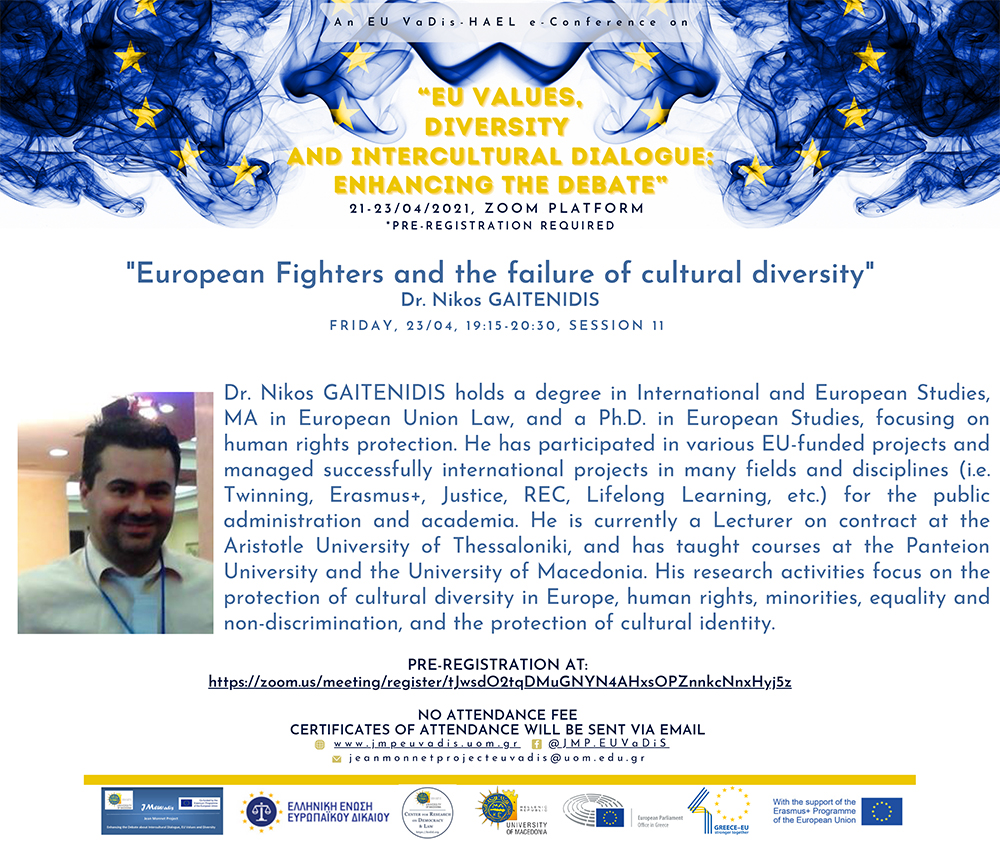Τριήμερο Διεθνές Συνέδριο «Αξίες της Ευρωπαϊκής Ένωσης, Πολυμορφία και Διαπολιτισμικός Διάλογος: Ενισχύοντας τη Συζήτηση» 21 — 23 Απριλίου 2021
Welcome Session — Opening Remarks
Despina ANAGNOSTOPOULOU
Despina ANAGNOSTOPOULOU, Associate Professor at the Department of International and European Studies at the University of Macedonia, and Academic Coordinator of the Jean Monnet Project EUVaDis opened the works of the e-Conference and welcomed the Speakers and the attendees, informing them on the scope of this event.
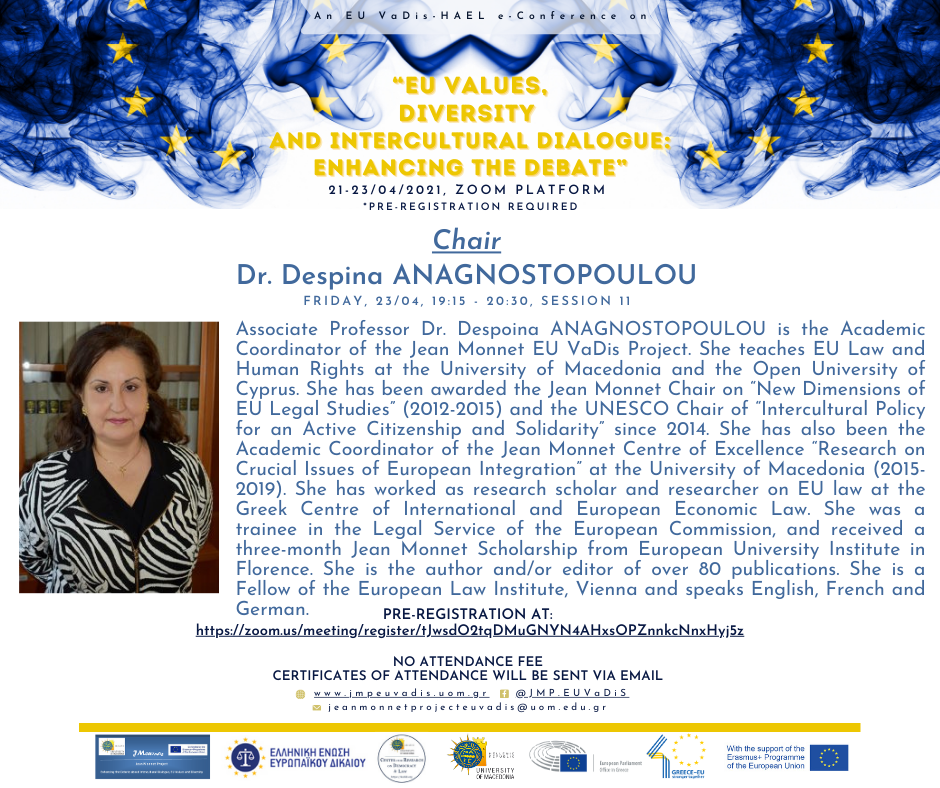
Evgenia ALEXANDROPOULOU
Evgenia ALEXANDROPOULOU, Professor at the Department of Applied Informatics, and Vice Rector of the University of Macedonia, was the first guest to share her opening remarks with us.
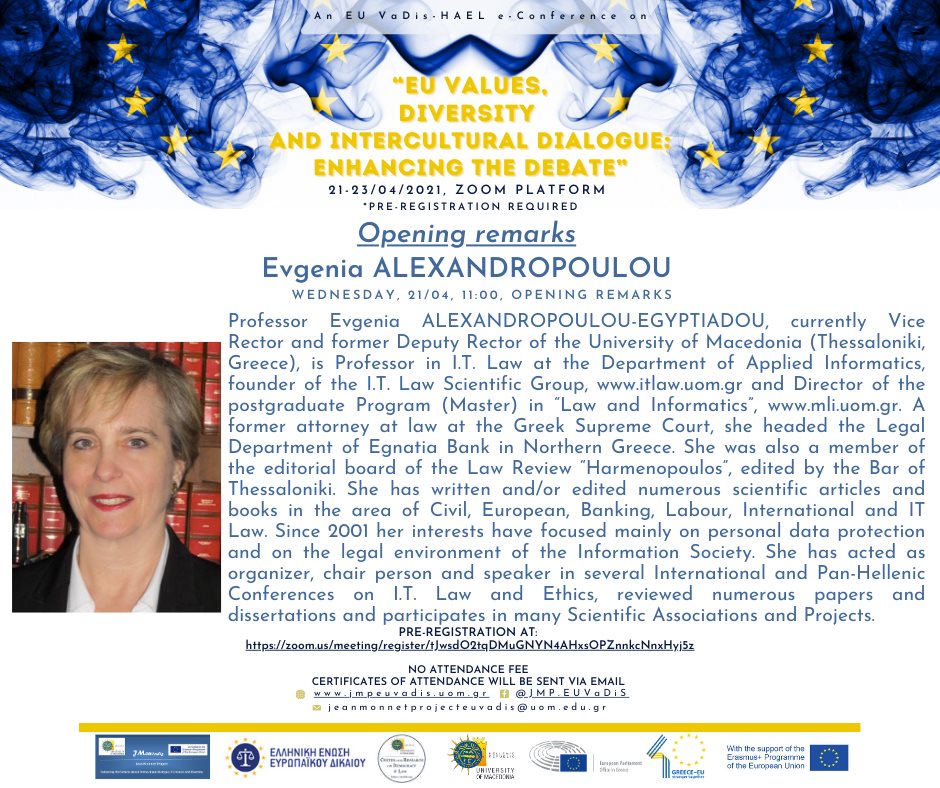
Athanasios ZERVAS
Athanasios ZERVAS, Professor at the Department of Music Science and Art, and Dean of the School of Social Sciences, Humanities and Arts at the University of Macedonia shared with us how Sophocles’ play “Antigone” and EU Values are connected.
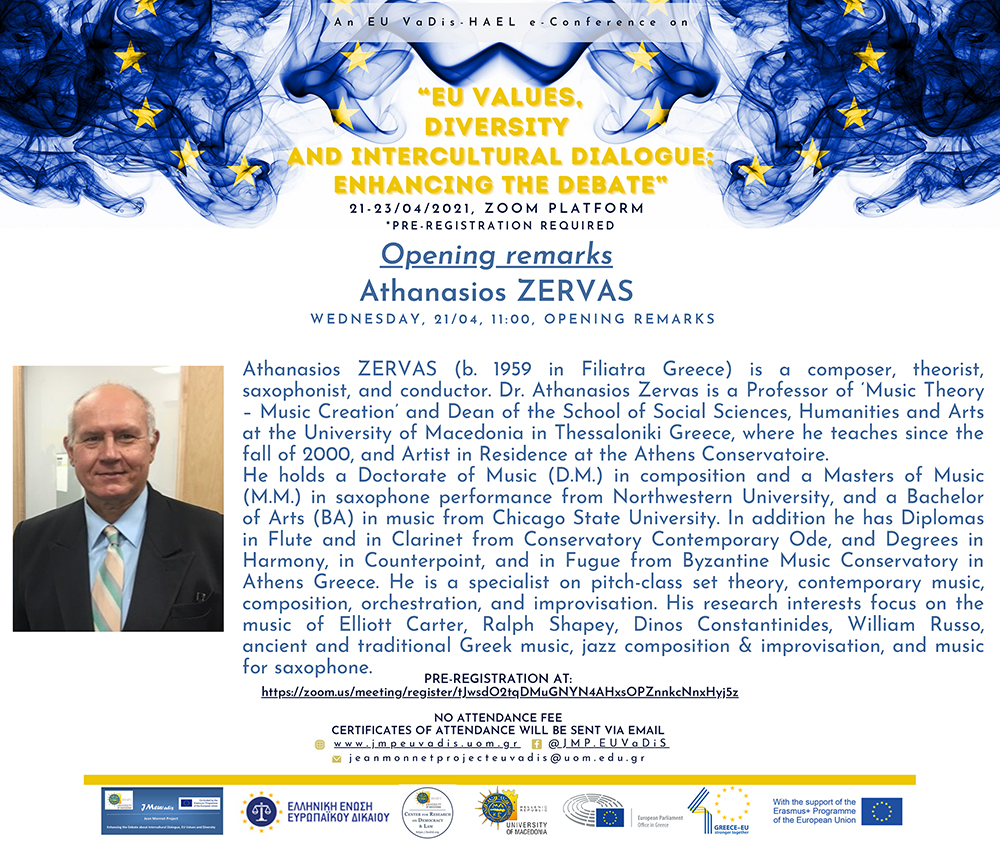
lias KOUSKOUVELIS
lias KOUSKOUVELIS, Professor and Head of the Department of International and European Studies at the University of Macedonia, has recorded a welcome message for our e-Conference.
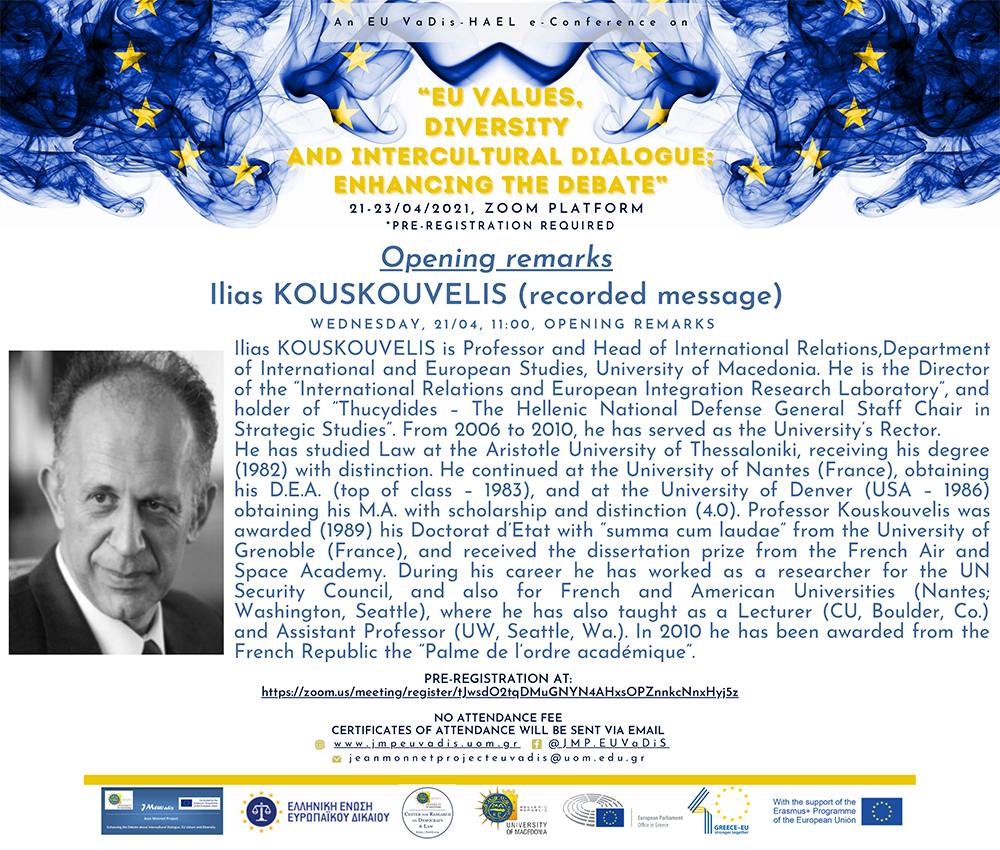
Margaritis SCHINAS
Margaritis SCHINAS, European Commission Vice- President, honoured us by sending a recorded message screened during the opening remarks section of our e-Conference. In his message he commented how the European Commission works in order to promote and secure the fundamental Values of the EU which were debated in our e-Conference.
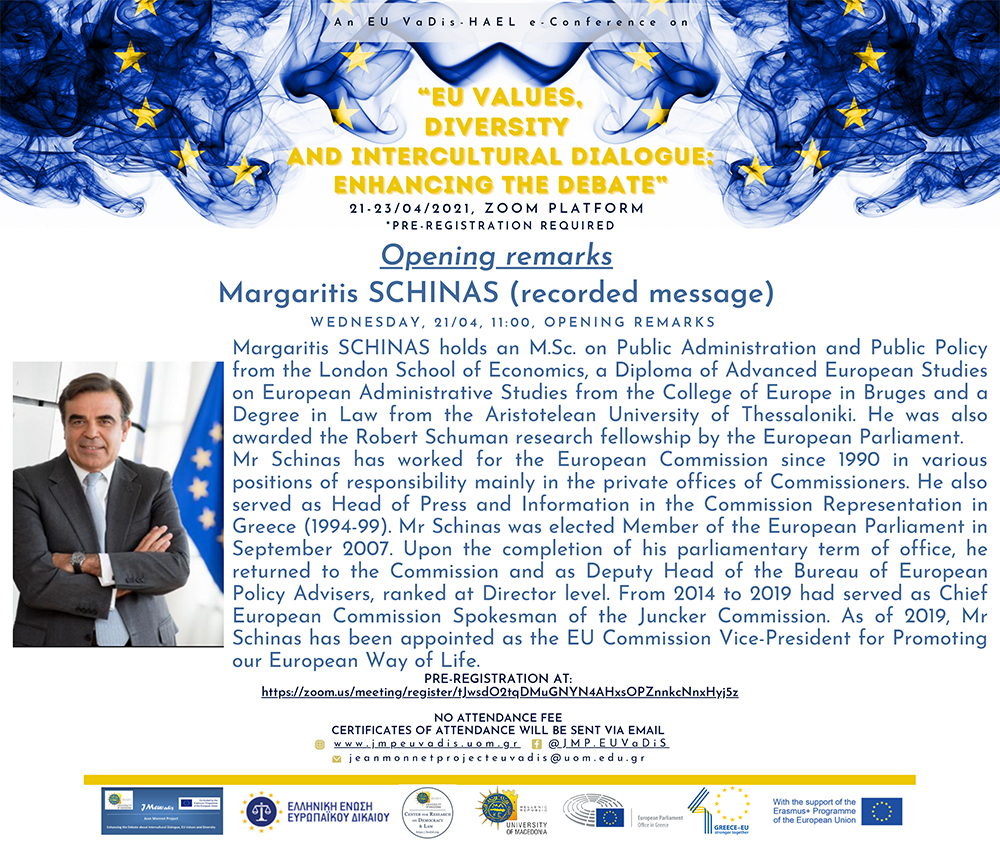
Costantinos TSOUTSOPLIDES
Costantinos TSOUTSOPLIDES, Head of the European Parliament Liaison Office in Athens, Greece, with the support of which this e-Conference was organised, gave us the European Parliament’s aspect regarding the EU Values debated throughout the 3-day event of ours.

ΕΙΣΑΓΩΓΙΚΗ ΟΜΙΛΙΑ — ΕΝΑΡΚΤΗΡΙΑ ΣΥΝΕΔΡΙΑ
Vassilios SKOURIS
Prof.Dr.Dr.h.c.mult. Vassilios SKOURIS, who holds among other titles the one of the President of the Governing Board of the Hellenic Association for the European Law (HAEL), co-organizer of this e-Conference, was be the Chair of our Opening Session.
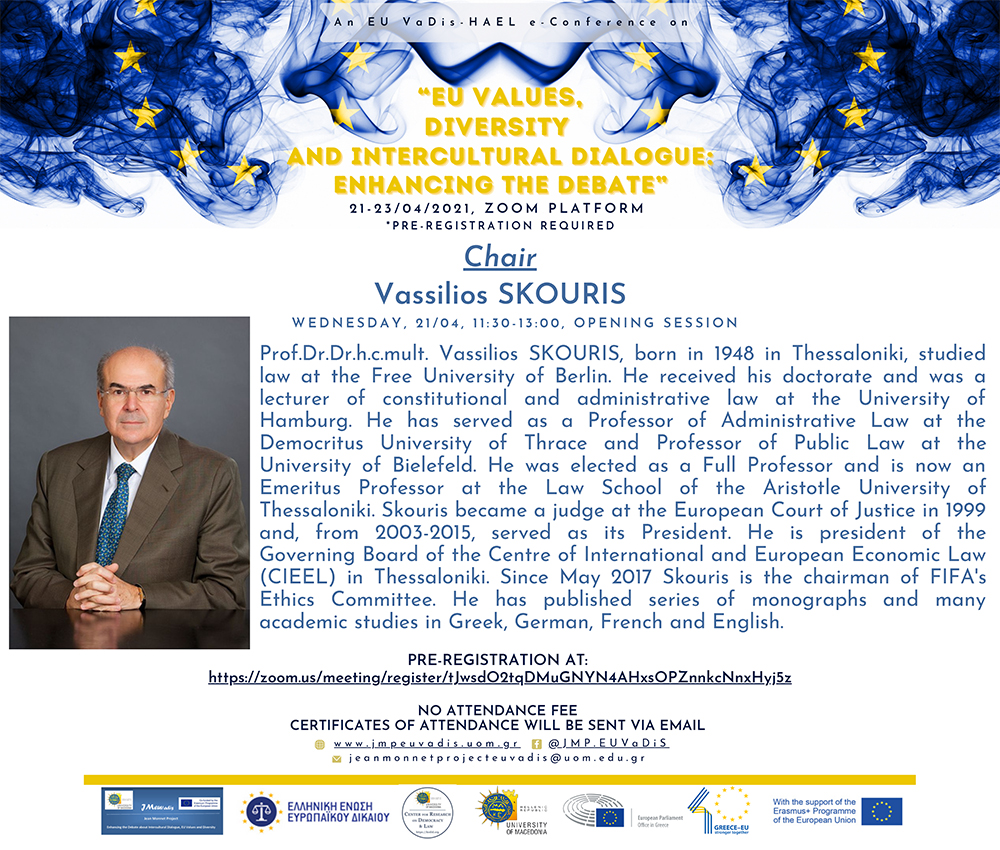
Sir Francis JACOBS
“The EU and the rule of law: recent developments and current prospects” is the title Sir Francis Jacobs, our Keynote Speaker, chose for his contribution to our e-Conference.
“Under the Treaty on European Union, one of the values on which the Union is founded is the rule of law. Indeed, it can be argued that the rule of law is the foundation of the European Union. It is designed to replace war and the use of force which have historically shaped the destiny of Europe. It is for that reason that the European Community was from the outset endowed with a Court of Justice to settle disputes between the Member States, and also disputes with the Community institutions“, states Sir Jacobs in the abstract of his speech.
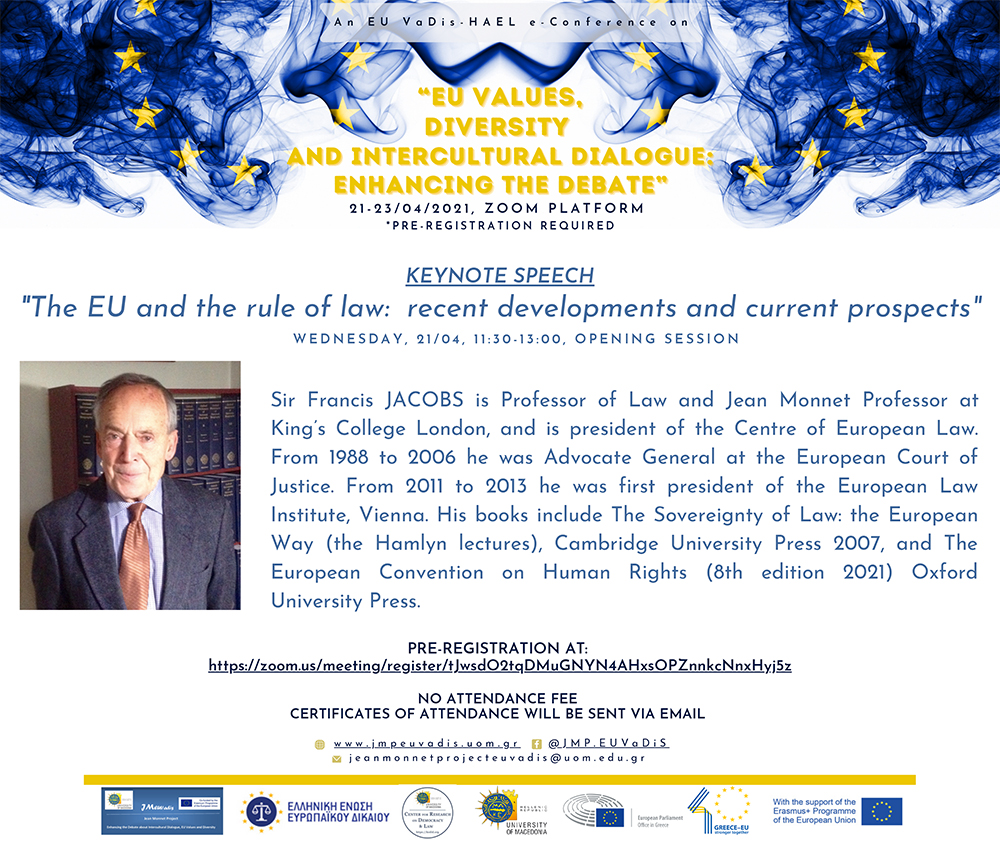
Professor TRIDIMAS, a leading scholar in the field of European Union law, and one of the most frequently quoted authors by Advocates General of the European Court of Justice and, on matters of EU law, by English courts, gave the introductory speech titled “Values, principles and rights: consensus and conflict”

ΘΕΜΑΤΙΚΗ ΣΥΝΕΔΡΙΑ 1
Professor Nikos SCANDAMIS moderated Session 1 of our e-Conference and contributed with a speech on “Human dignity as a value and a norm in the European Union”.
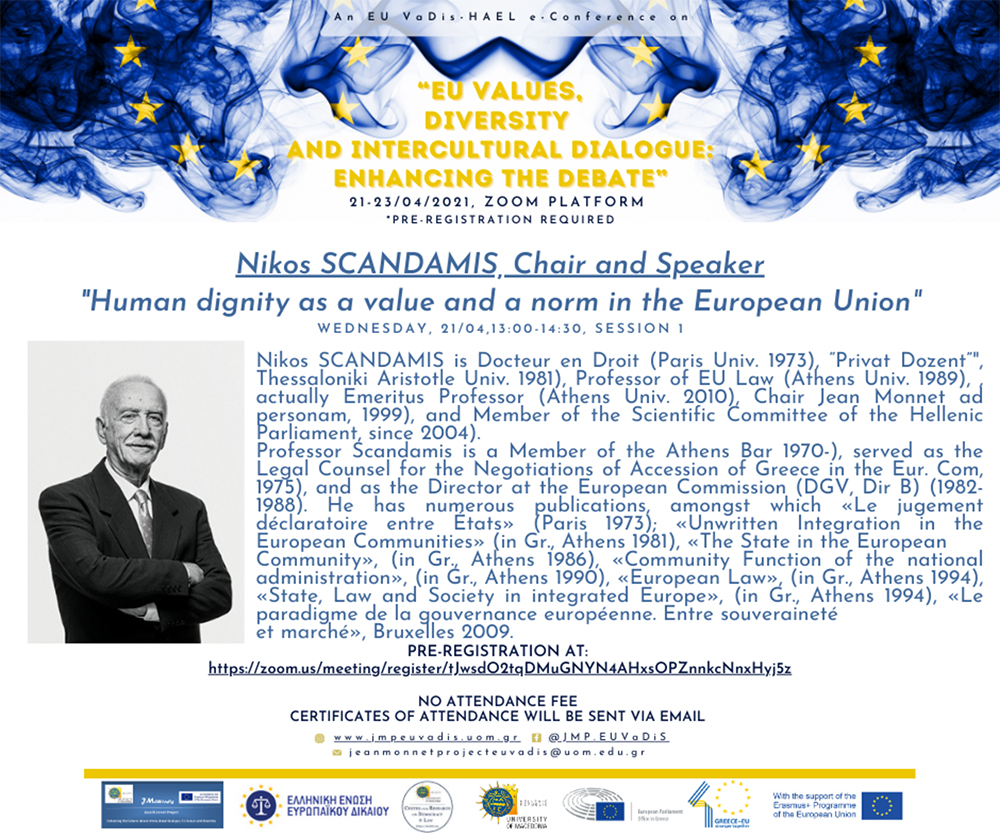
Kosmas BOSKOVITS
Kosmas BOSKOVITS, Deputy Legal Counselor, Legal Service, EU Affairs Hellenic Ministry for Foreign Affairs, participated with a speech on “Rule of Law and the idea of Republican Liberty”.
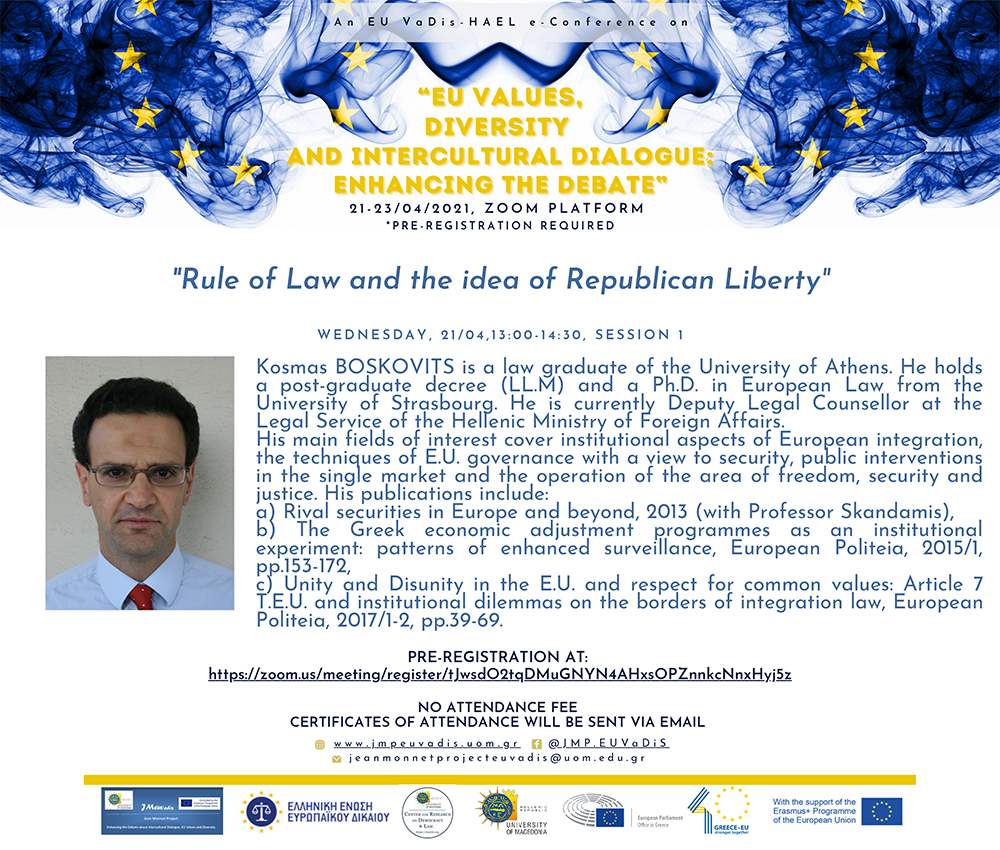
Professor Susanna-Maria CAFARO concluded with her speech the first Session of our e-Conference. She discussed “Legal Theory of European Integration: A Supranational Democracy Model?”.
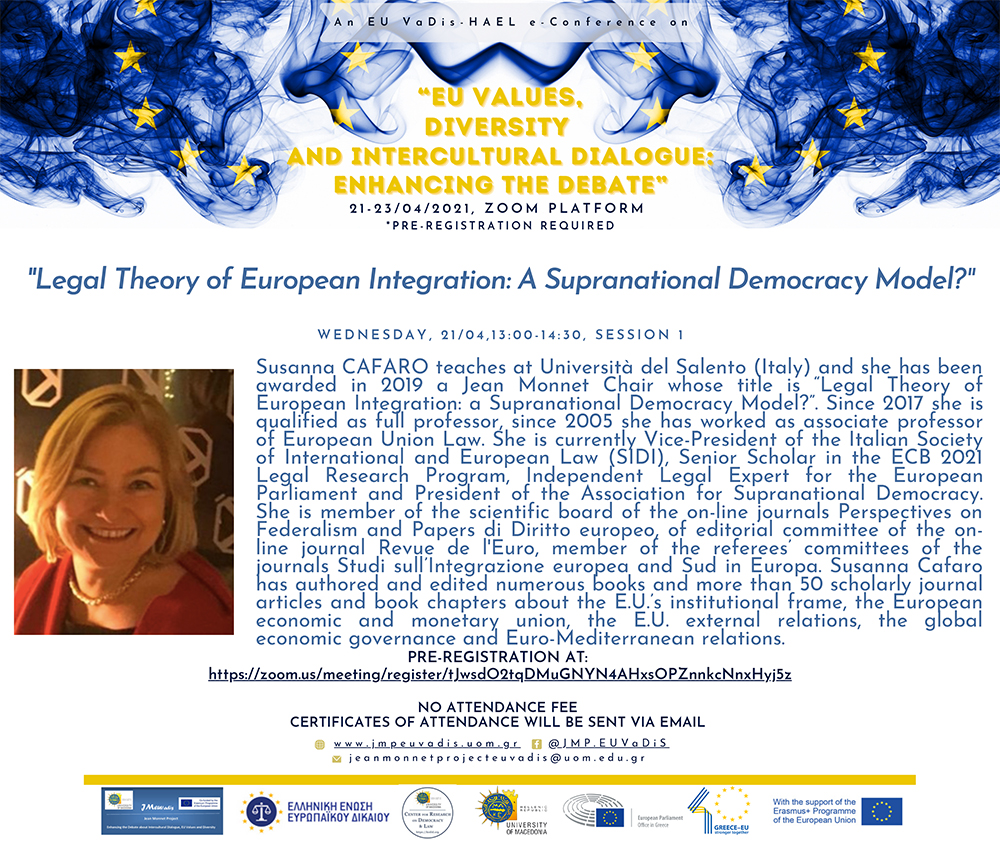
ΘΕΜΑΤΙΚΗ ΣΥΝΕΔΡΙΑ 2
Dimitris SKIADAS
Dr. Dimitris SKIADAS, Professor of European Governance and Jean Monnet Chair at the University of Macedonia in Thessaloniki, Greece, and Visiting Researcher at the Center for the Study of Europe/Boston University moderated all the way from Boston Session 2 on “EU Values and Fundamental Rights”.
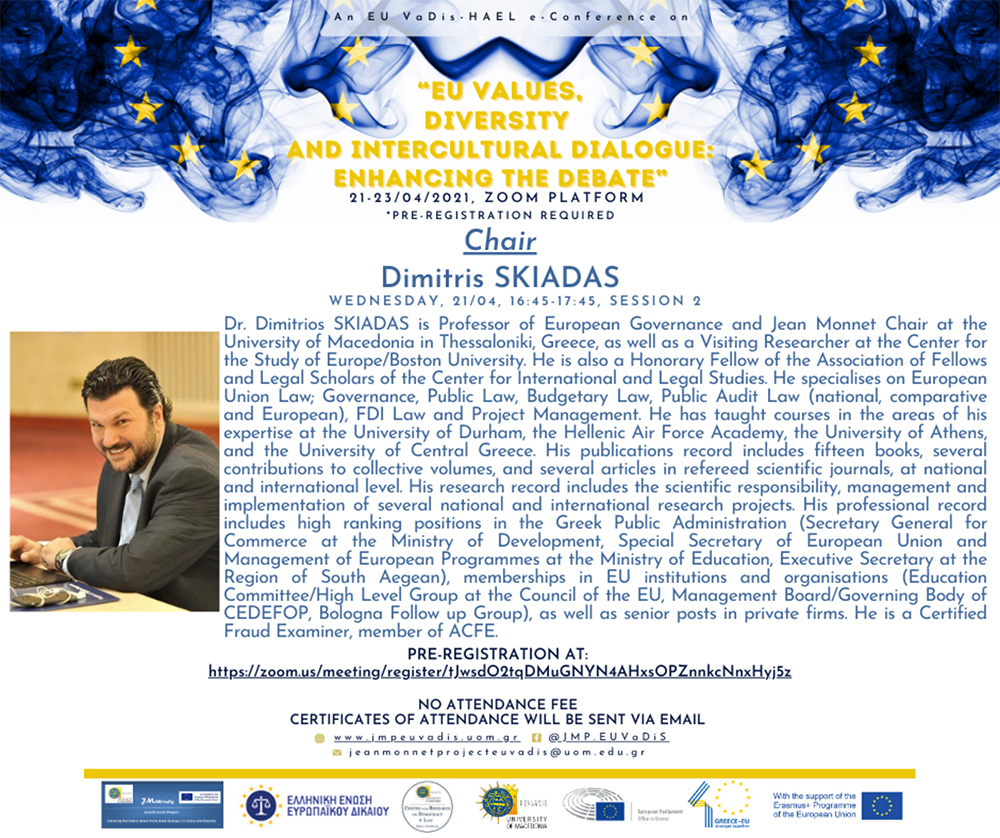
Konstantinos KOUROUPIS, Assistant Professor of European and Data Rights Law was be the first speaker of Session 2. The topic of his speech concerned the lawfulness of the restrictions imposed to the exercise of fundamental rights in favour of public health and safety in the era of the pandemic.
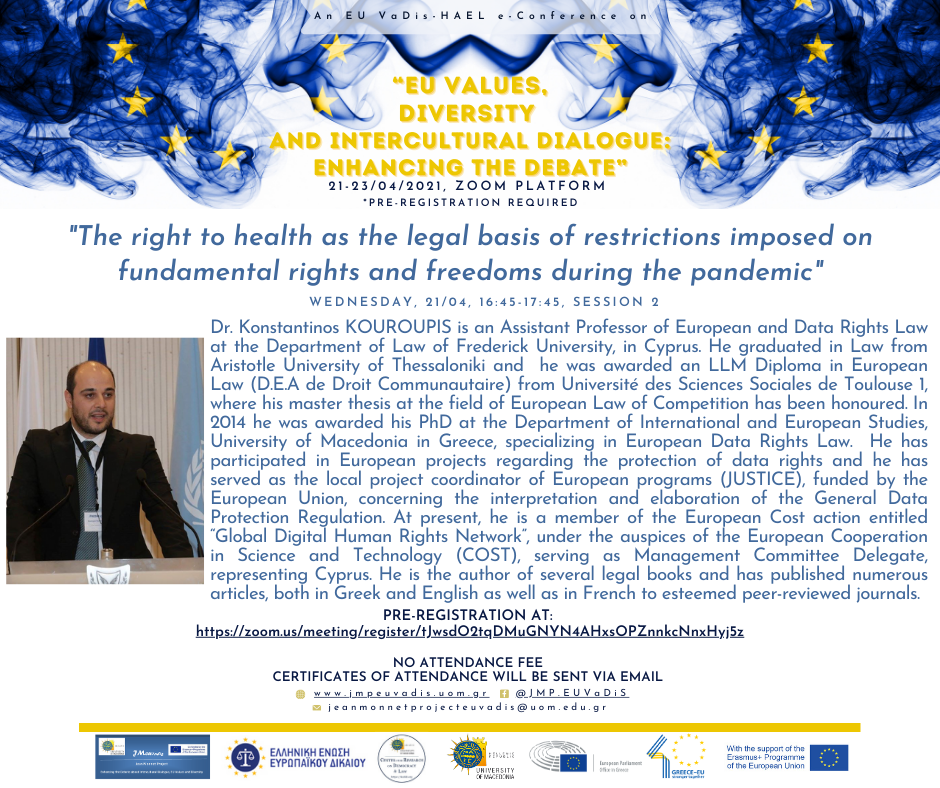
Vasiliki KOSTA and Darinka PIQANI
Vasiliki KOSTA, Assistant Professor of European Union Law, Europa Institute at Leiden University, had a joint presentation with Professor Darinka Piqani, Assistant Professor in the same University, discussing their paper “When trade and academic freedom meet at a rule of law crisis crossroad: some thoughts on case C-66/18 Commission v. Hungary”.
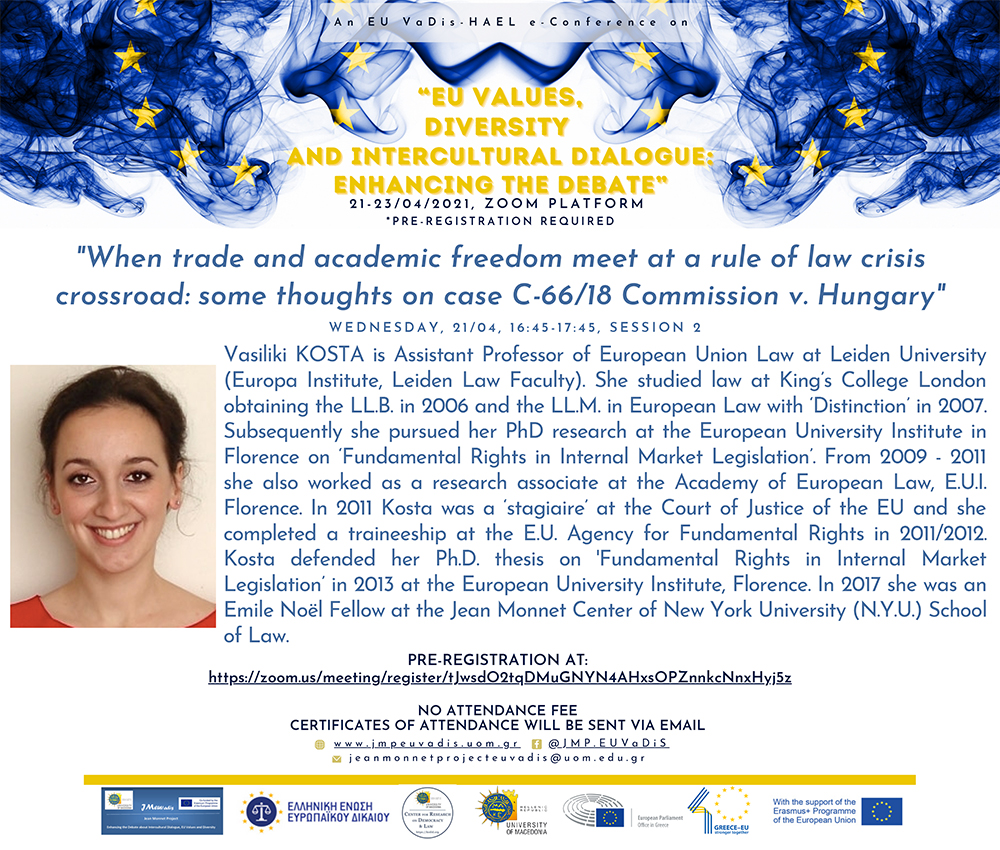
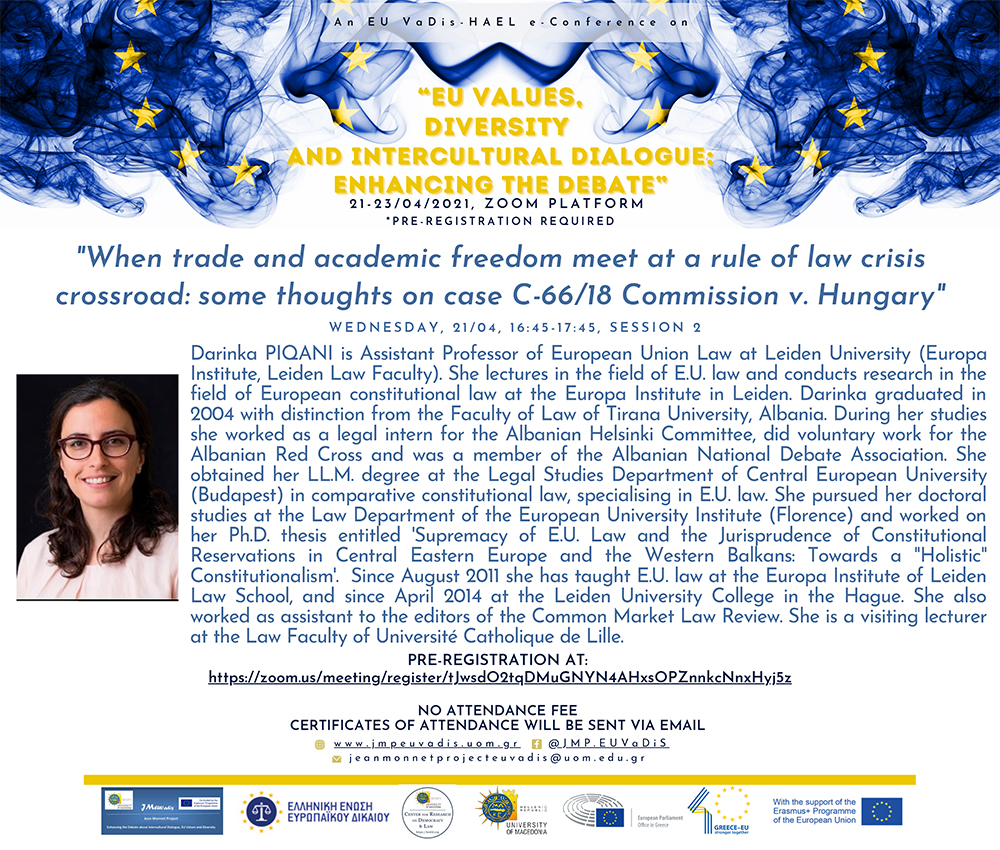
Gabriel TOGGENBURG
Session 2 concluded with the presentation coming from Dr. Gabriel TOGGENBURG, Policy Coordinator at the European Union Agency for Fundamental Rights, who briefly referred to the relationship between the EU values and the EU Charter, pointed to the impact the Charter had over the last 20 years, referred to the Commission’s strategy and the recently adopted Council conclusions in that regard. He highlighted both the potential and the limitations of the Charter and explored the question what is needed to make sure that in the 3rd decade of its existence the Charter plays a relevant role in our lives.
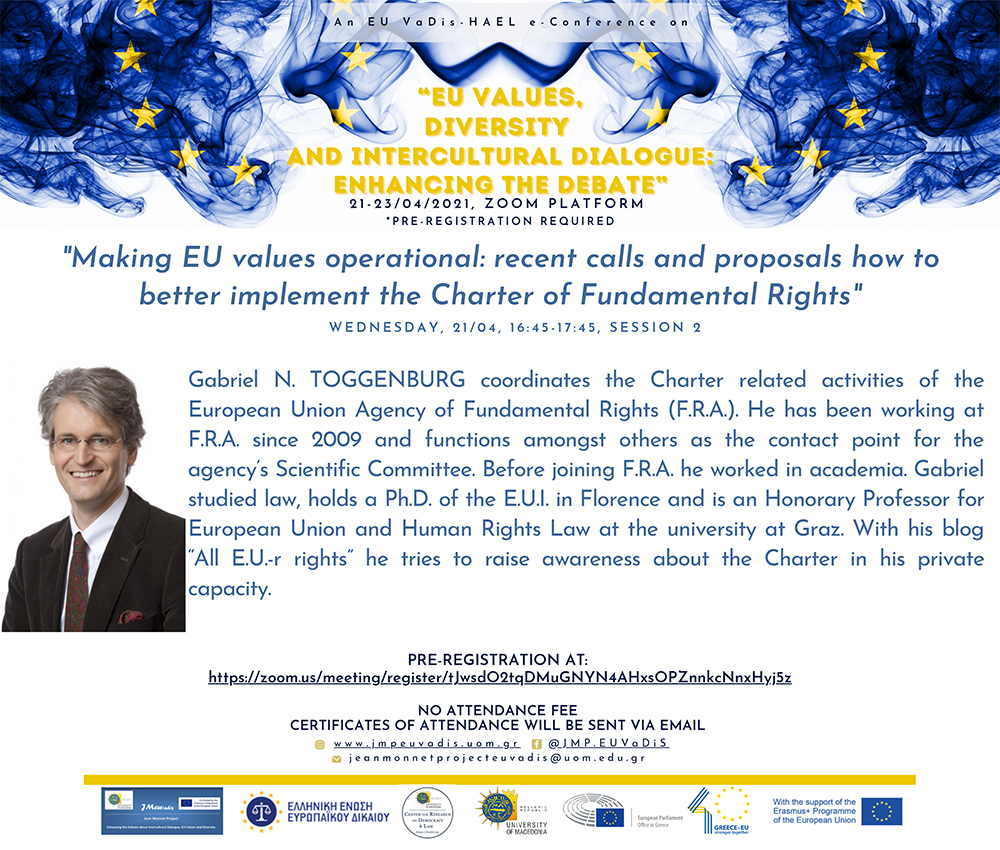
ΘΕΜΑΤΙΚΗ ΣΥΝΕΔΡΙΑ 3
Ioannis PAPADOPOULOS
Professor Ioannis Papadopoulos, Director of the Center for Research on Democracy and Law, honoured us by accepting the invitation to moderate Session 3: Democracy and European Citizenship in the EU.
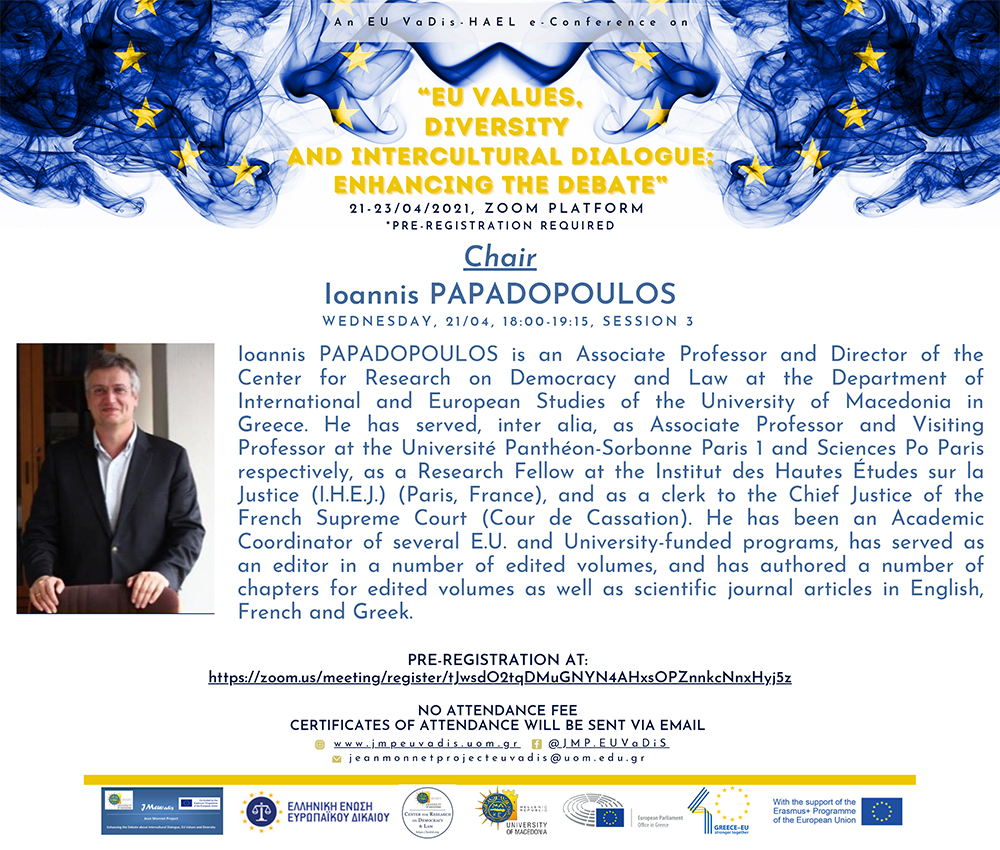
“Although democratic principles in the strict sense refer only to the Title II of the TEU introduced by the Lisbon Treaty, in a broad sense they have established in parallel with the entire construction of the European Union through the evolution of its legal system. Nevertheless, because of the time of difficulty that the Union is experiencing, one wonders whether the steps taken so far have led to a reality, that is a functioning democratic model, or represents a challenge to overcome“, commented Professor RUSSO in the abstract of her speech that took place during Session 3.
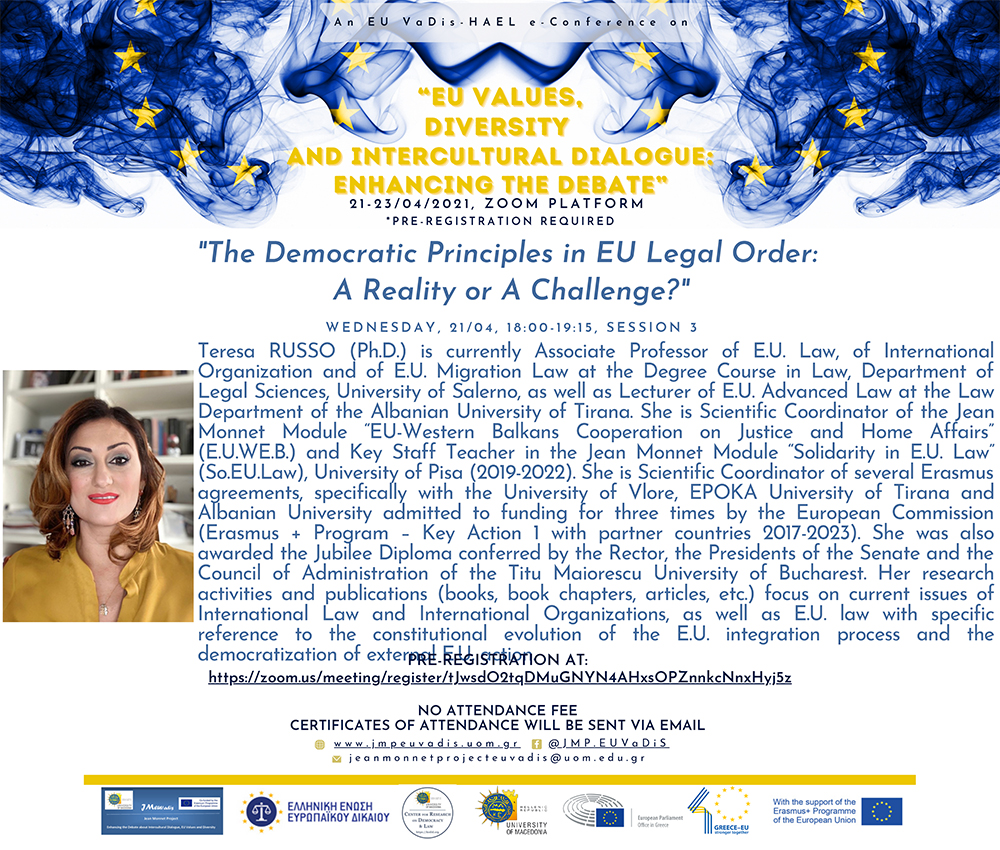
“AI is presented as a solution to an ever-increasing number of the problems in our society, being entrusted with tasks as diverse as filtering what is said on social networks, assisting in the creation of a vaccine or assessing individuals for recruitment. A speaker who airs doubts or makes recommendations about how to put certain limits to technologies does not have the same impact as one who presents these technologies as solutions. The philosopher Günther Anders said that “Nothing discredits a man more readily today than to be suspected of criticising machines””, commented Director Jan Kleijssen from the Council of Europe Information Society Group, during his speech “Artificial Intelligence challenges on Human Rights, Rule of Law and Democracy” in Session 3.
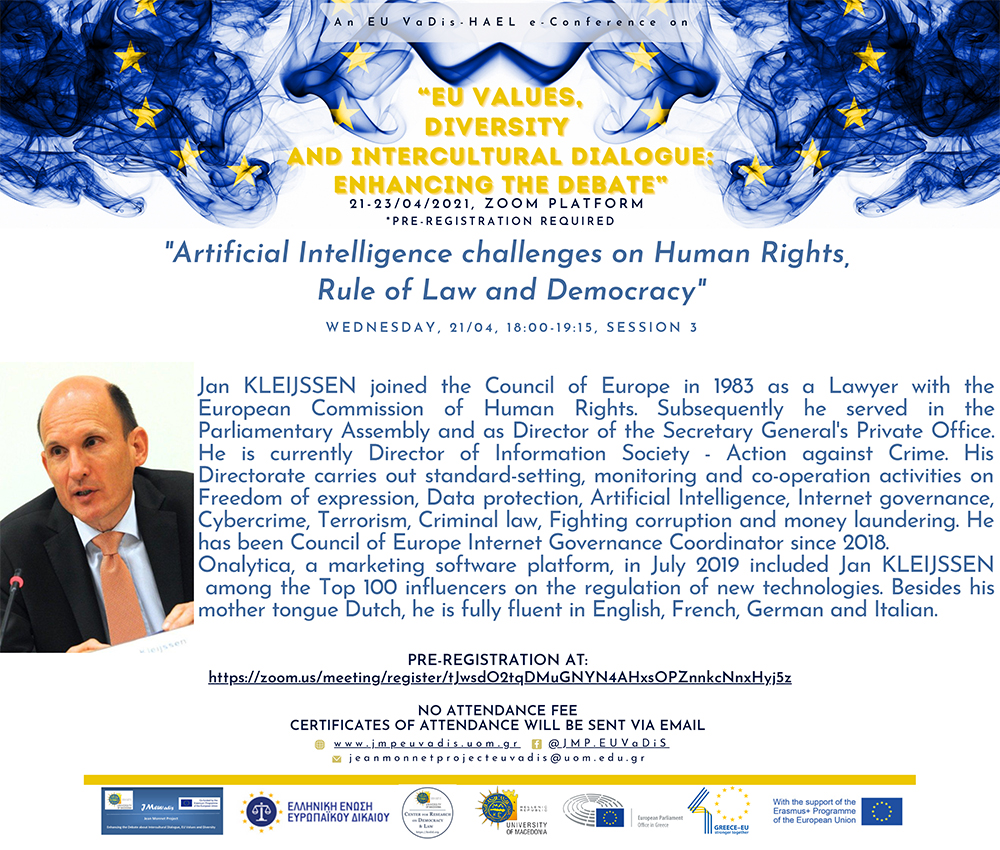
ΘΕΜΑΤΙΚΗ ΣΥΝΕΔΡΙΑ 4
Michail CHRYSOMALLIS
Professor Michail CHRYSOMALLIS, Professor and Jean Monnet Chair on the Rule of Law in the EU at the Law School, Democritus University of Thrace, honoured us by accepting the invitation to preside this 4 Speakers-Session.
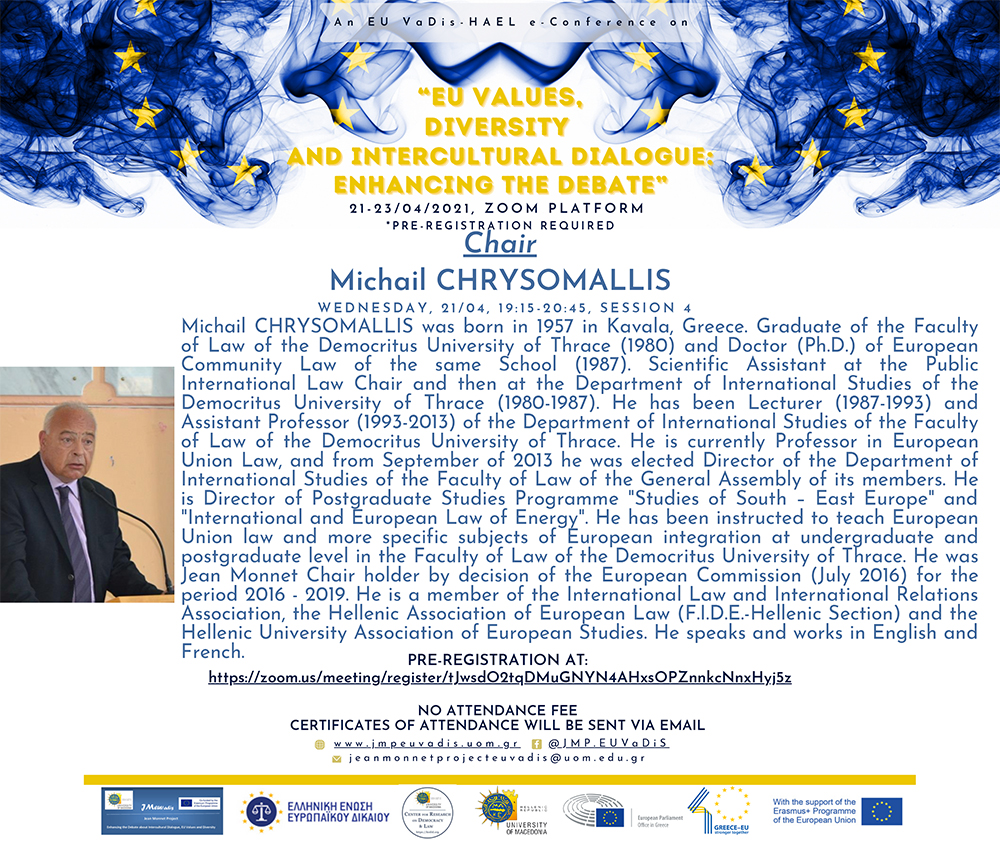
“The principle of judicial protection in the application of EU law as a principle of a federal union of law” was the title of Professor Asterios PLIAKOS contribution to the 4th Session of our e-Conference.
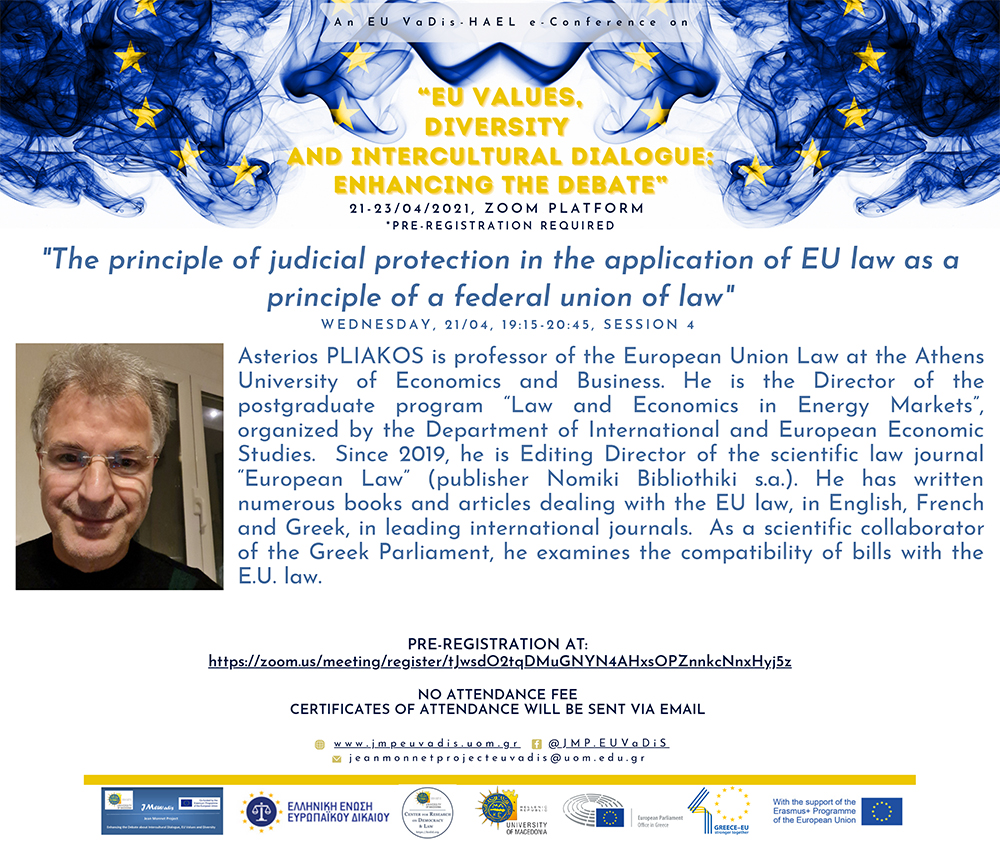
“By ensuring a more solid legal basis for political morality in a multinational project, such as that of the EU, the hard core of European values contributes reflectively to the understanding of a common identity by European citizens and European institutions, thus facilitating further integration. Therefore, more moral and political legitimacy at the basis of the Union brings about a stronger identity ‘stamp’ for the European edifice, which in turn produces a more functional system, with more and better procedural guarantees for the production of common policies” commented Professor Ioannis PAPADOPOULOS in his speech during Session 4.
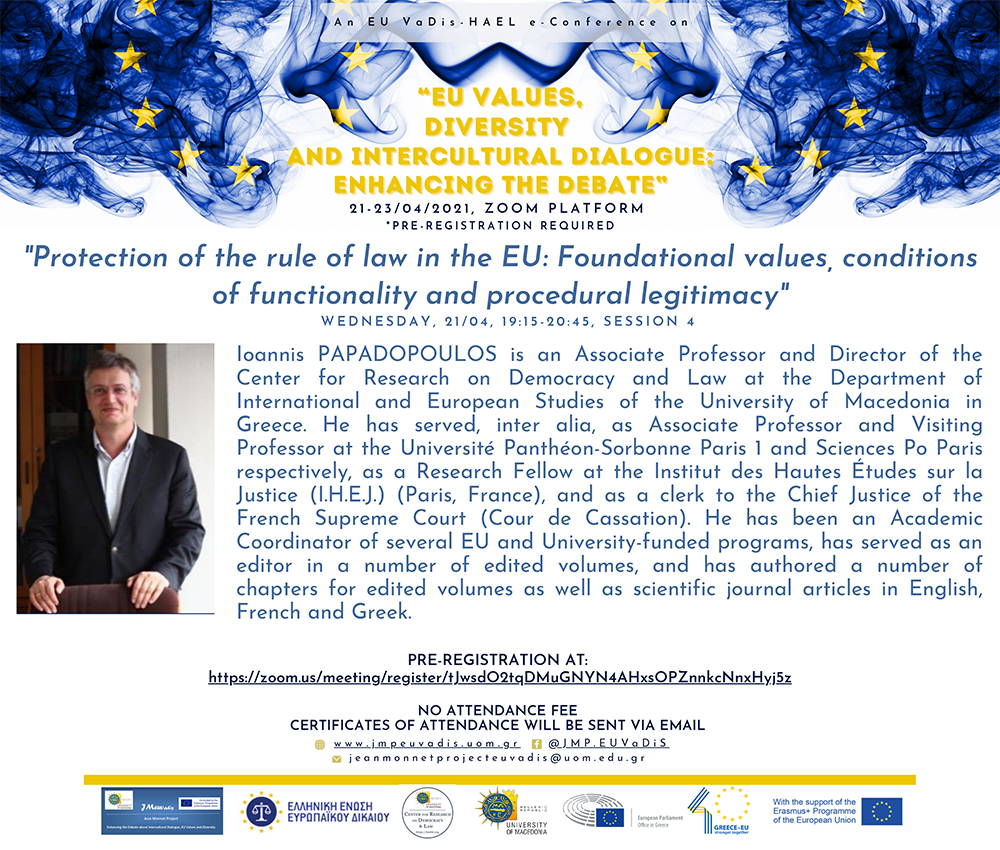
Associate Professor of European Union Administration Law, and Academic Coordinator of the postgraduate programme “European Union Law”, at the Open University of Cyprus, Alexandros TSADIRAS, shared his views and explored two main approaches through which Member States’ compliance with the Rule of Law can be reviewed and even sanctioned at EU level. His analysis concluded with a brief comment on the proper response to fundamental political problems.
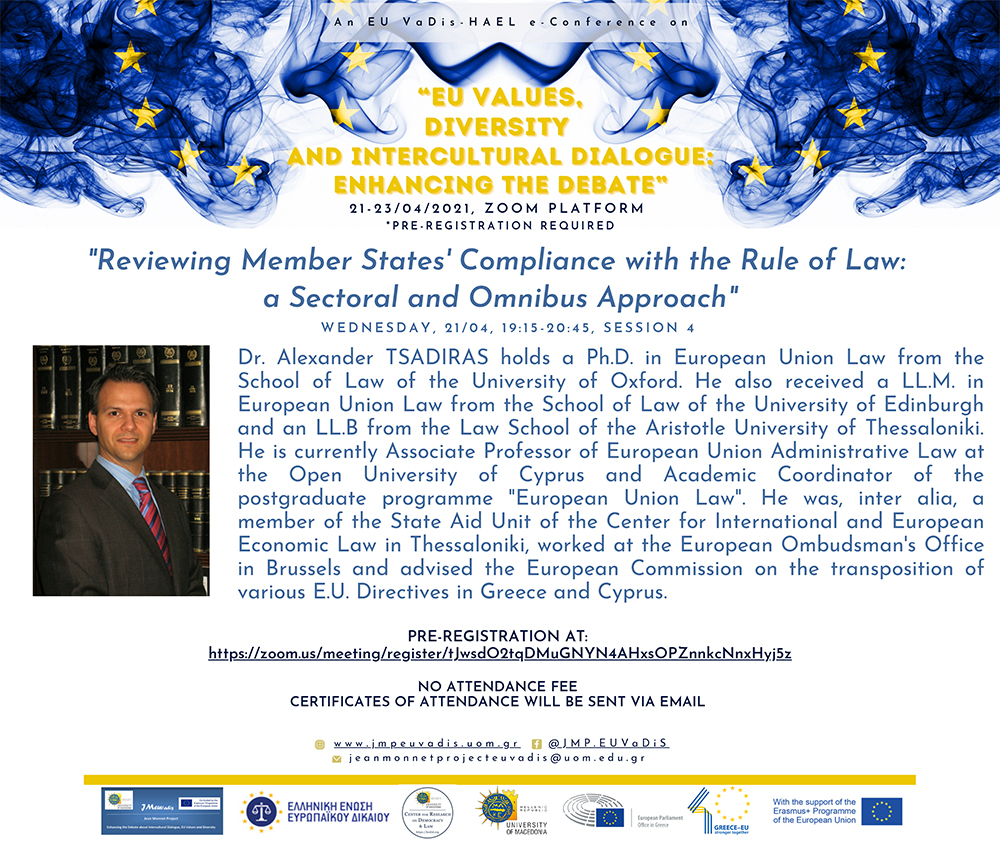
Professor Papageorgiou n his presentation he examined the political and policy reasons that pester the application of Article 7 TEU in ECJ cases (EC against Poland, 2017, and EP against Hungary, 2018) , and assessed the viability and feasibility of enforcing the first stage of the procedure established there. Also, he analysed the political context, the role of the various EU institutions and the reactions of the Member States concerned. In addition, he looked into the relationship between Article 50 TEU (on the withdrawal from the EU) and Article 7 TEU, regarding to possibility to consider an implicit right to expel a Member State from the EU.
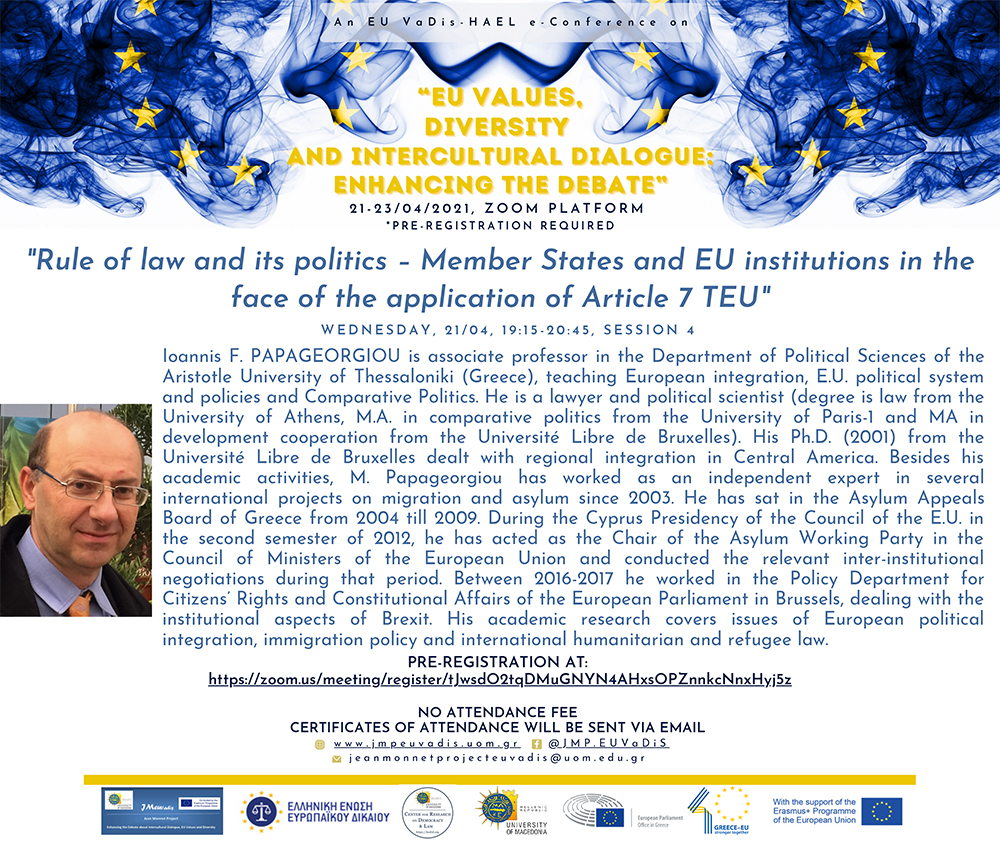
ΘΕΜΑΤΙΚΗ ΣΥΝΕΔΡΙΑ 5
Fotini ASDERAKI
Foteini ASDERAKI, Associate Professor of European Integration Theory and European Educational Policy at the Department of International and European Studies in University of Piraeus, honoured us by accepting our invitation to serve as the Chair of Session 5.
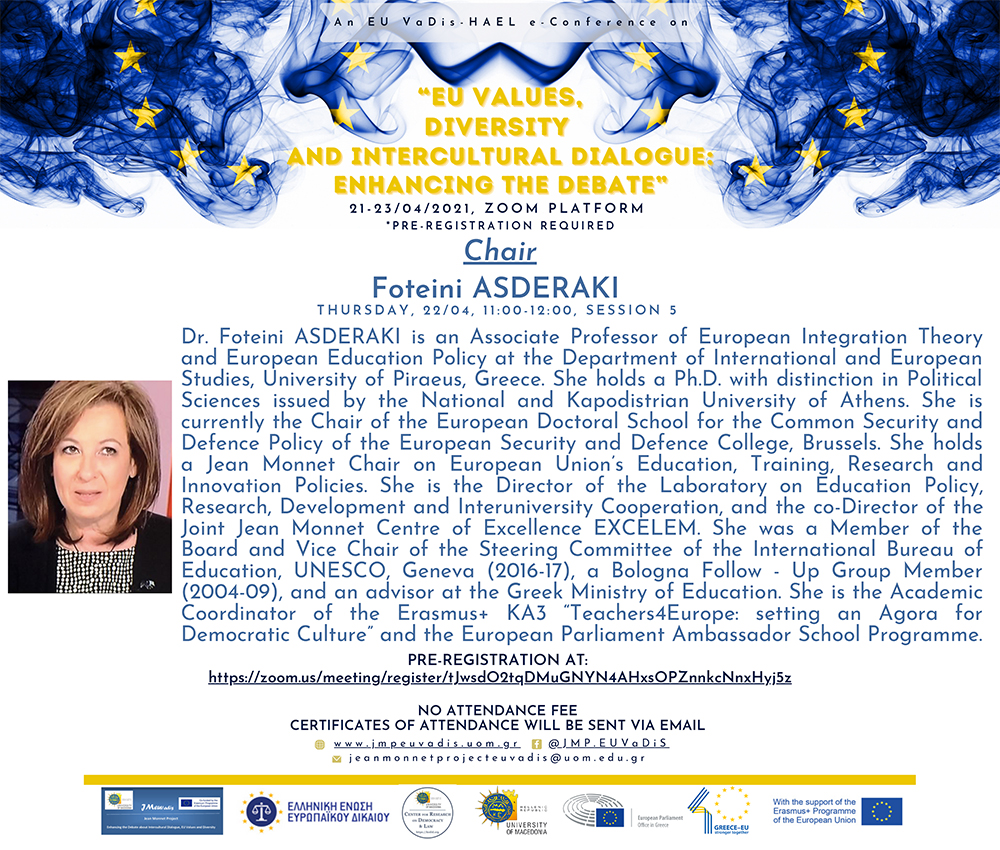
Bénédicte FAUVARQUE- COSSON
Bénédicte FAUVARQUE- COSSON, Judge at the Conseil d’ Etat, Paris, France shared her views on “Promoting legal education and active citizenship at the EU level” in Session 5.
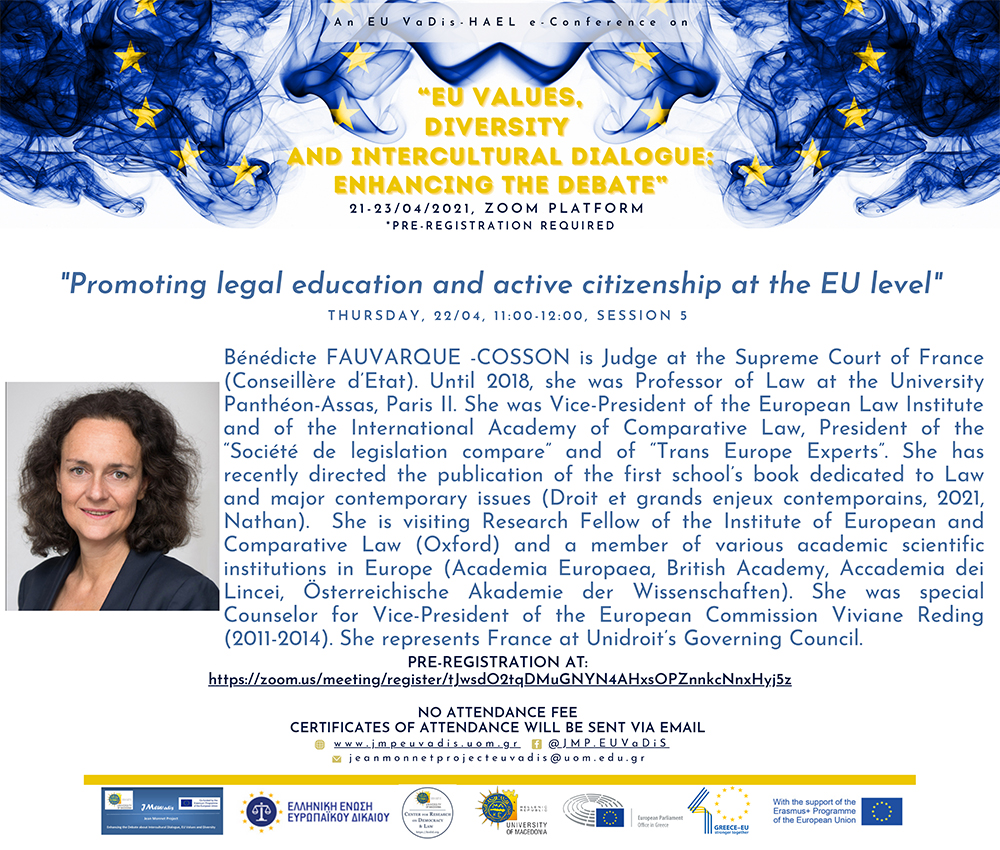
“The “Others” amongst “Us” – Immigration, Integration, and the Law in the European Union” is the title Professor Moritz Jesse chose for his speech that took place in Session 5 of our e-Conference.
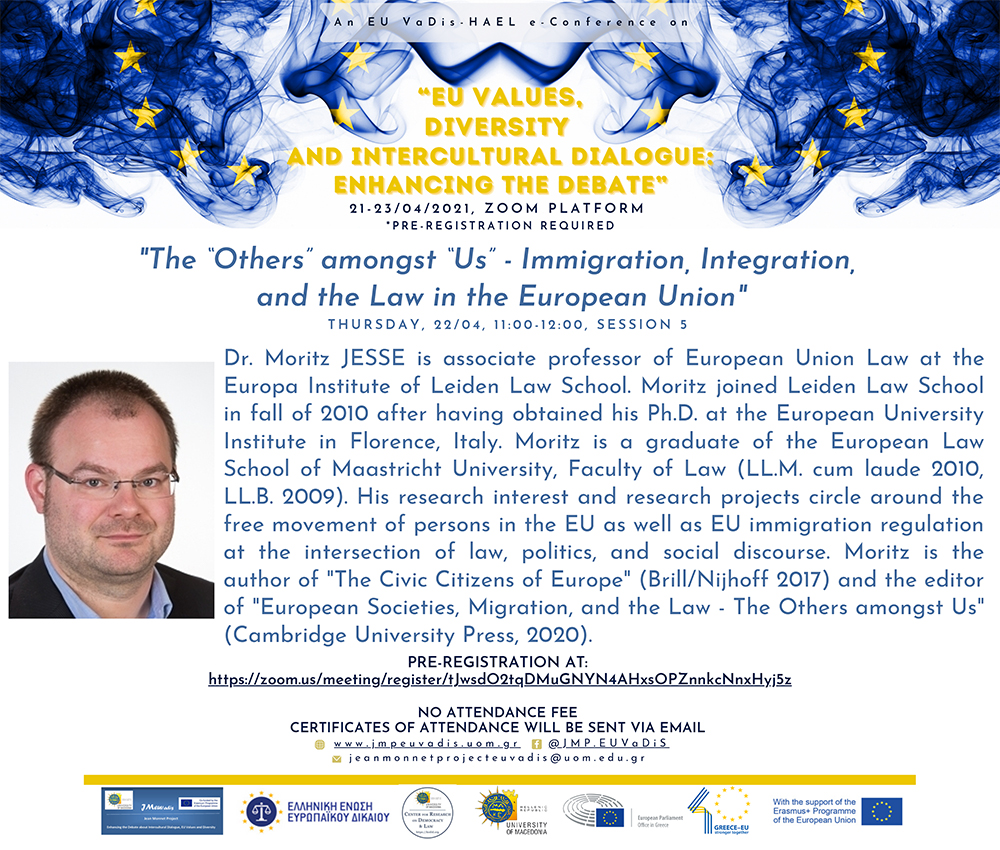
ΘΕΜΑΤΙΚΗ ΣΥΝΕΔΡΙΑ 6
Despina ANAGNOSTOPOULOU
Despoina ANAGNOSTOPOULOU, Associate Professor at the Department of International and European Studies at the University of Macedonia, and Academic Coordinator of the Jean Monnet Project EUVaDis chaired SESSION 6: Hate speech as the negation of EU Values.
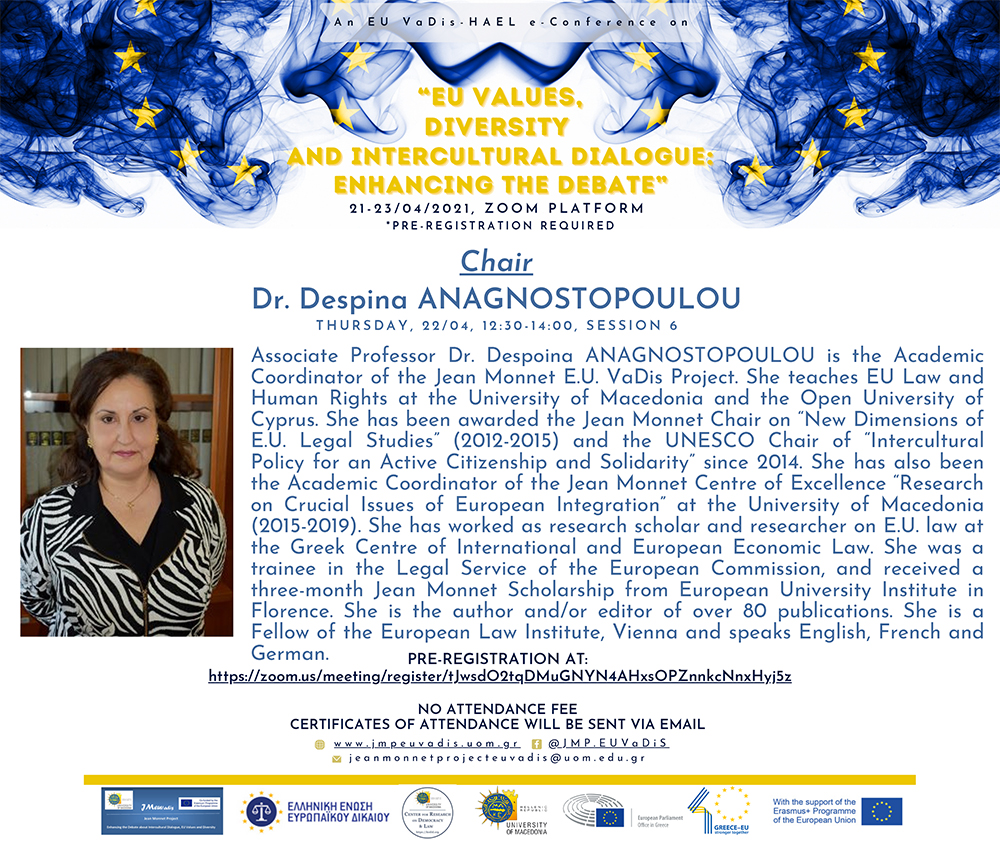
Patrick PENNINCKX, Head of Information Society Group at the Council of Europe shared his views and the latest data related to “Hate Speech on- and off-line”.
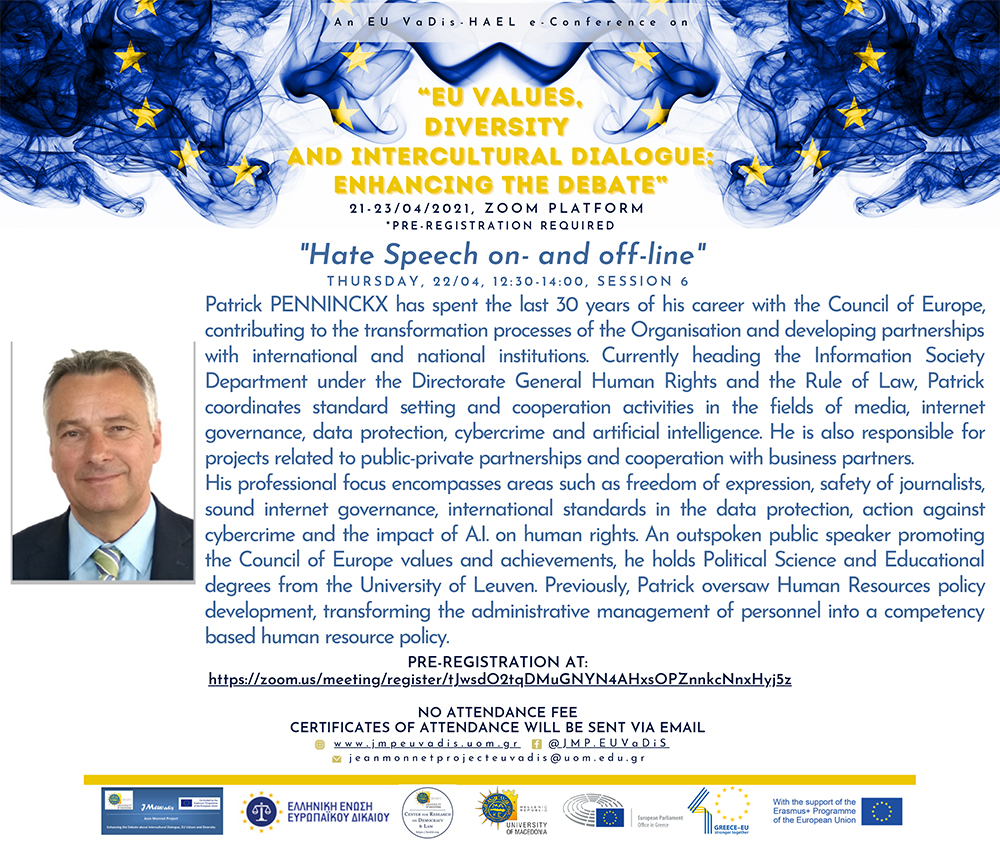
“Hate speech and religion” is the topic Professor Lina PAPADOPOULOU chose for her speech during Session 6 of our e-Conference.
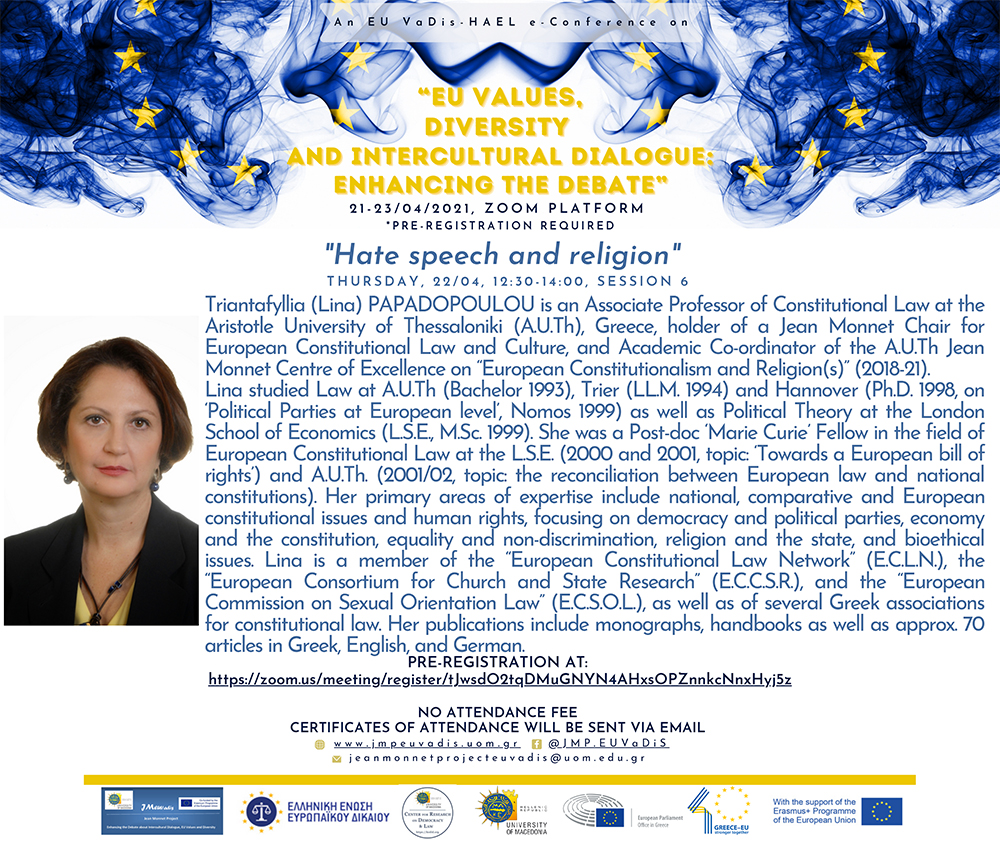
“SOGIESC based hate speech in Europe: the state of play” is the title of the presentation from Eleni TSETSEKOU, Head of the Sexual Orientation and Gender Identity Unit (SOGI) of the Council of Europe
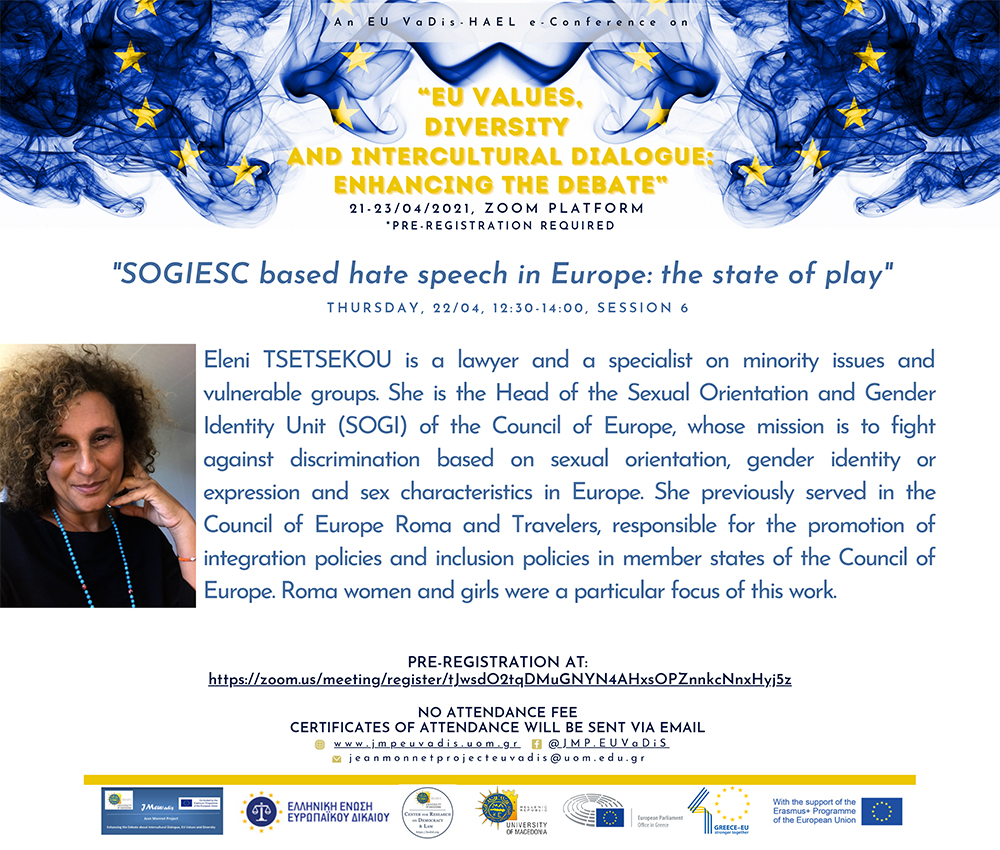
Dr. Evangelia PSYCHOGIOPOULOU, Senior research fellow at the Hellenic Foundation for European & Foreign Policy (ELIAMEP), commented on “The EU’s regulatory approaches to countering hate speech online” during Session 6 of our e-Conference.
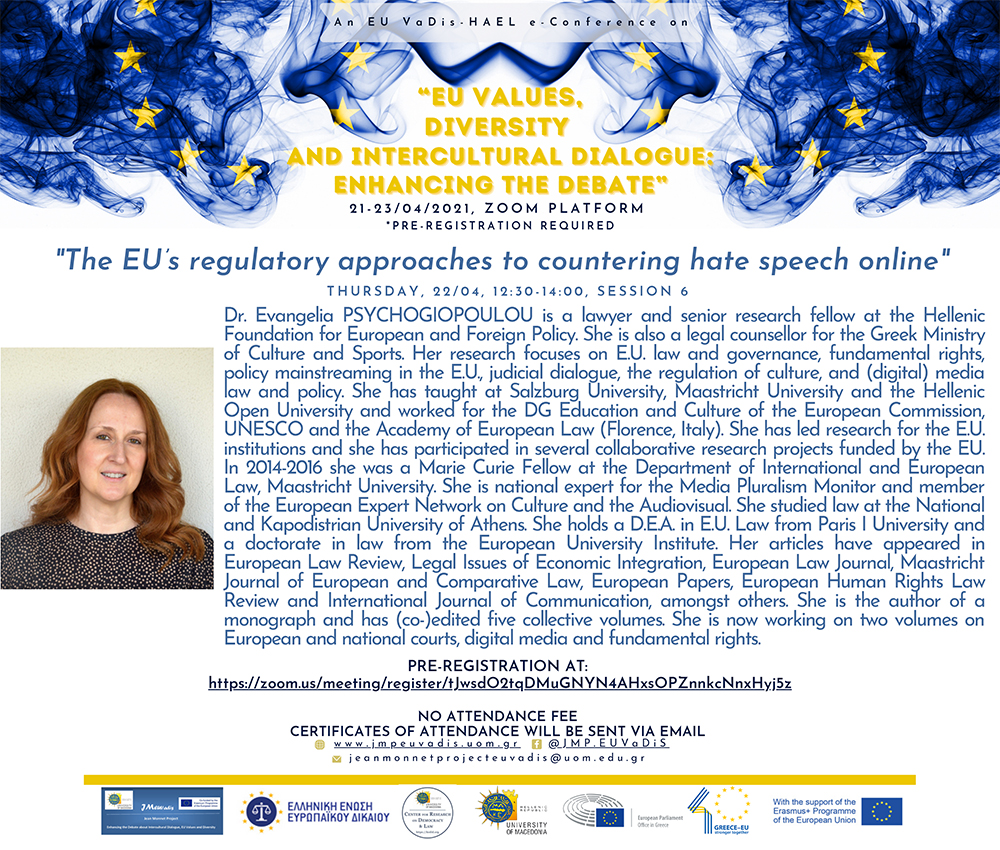
ΘΕΜΑΤΙΚΗ ΣΥΝΕΔΡΙΑ 7
Vasilis HATZOPOULOS
Professor Vasilis HATZOPOULOS, Chair and a Speaker in Session 7, in his speech “Algorithms, Equality and Diversity” discussed the risks and some means of tackling generalized use of algorithms for all sorts of decision-making, from hiring employees to giving out loans, and from detaining suspects to delivering health treatments that raise a very important issue: algorithms risk replicating and amplifying already existing human biases.

Professor Alina TRYFONIDOU examined during her presentation the recent developments in order to assess how LGBT-inclusive the EU currently is. The Commission’s recently announced LGBTIQ+ Equality Strategy 2020-2025 was also considered in order to assess its potential contribution to making the EU a more LGBT-inclusive polity.
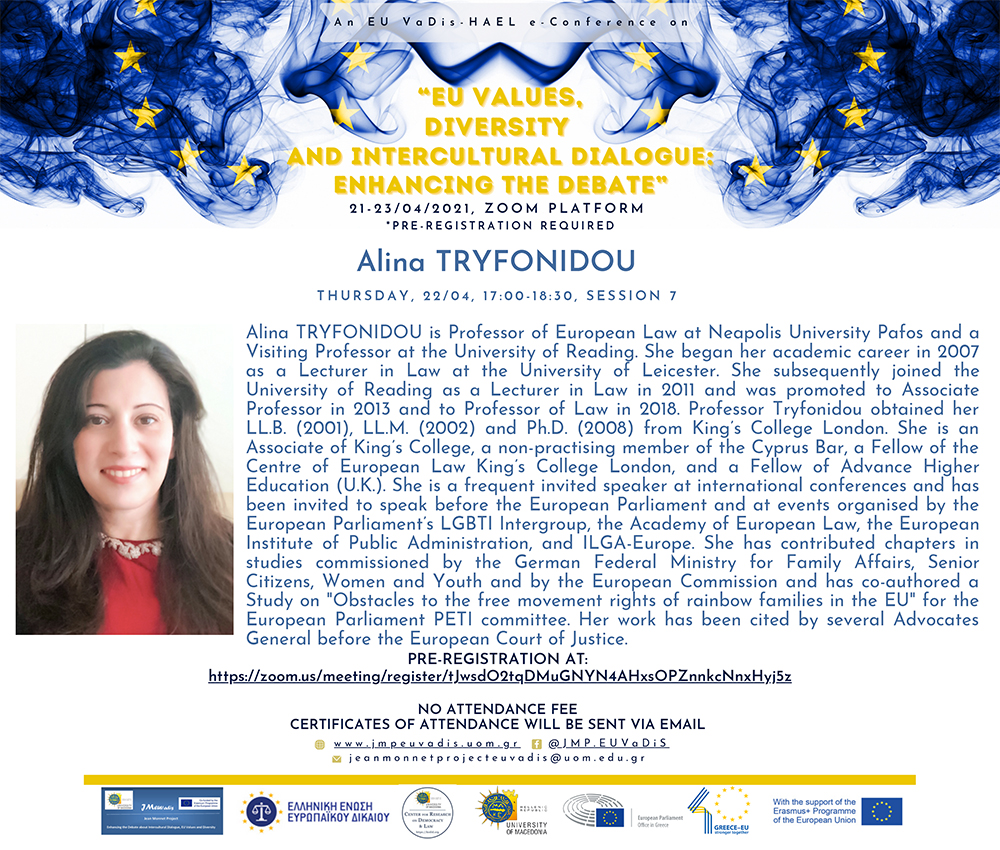
In the context of Professor’s KONSTA presentation, she argued that specific features of EU Law reveal a value system which is endemic to the European legal culture, if compared to other legal cultures in the world, such as those of the US and China, or other religious and traditional legal systems.
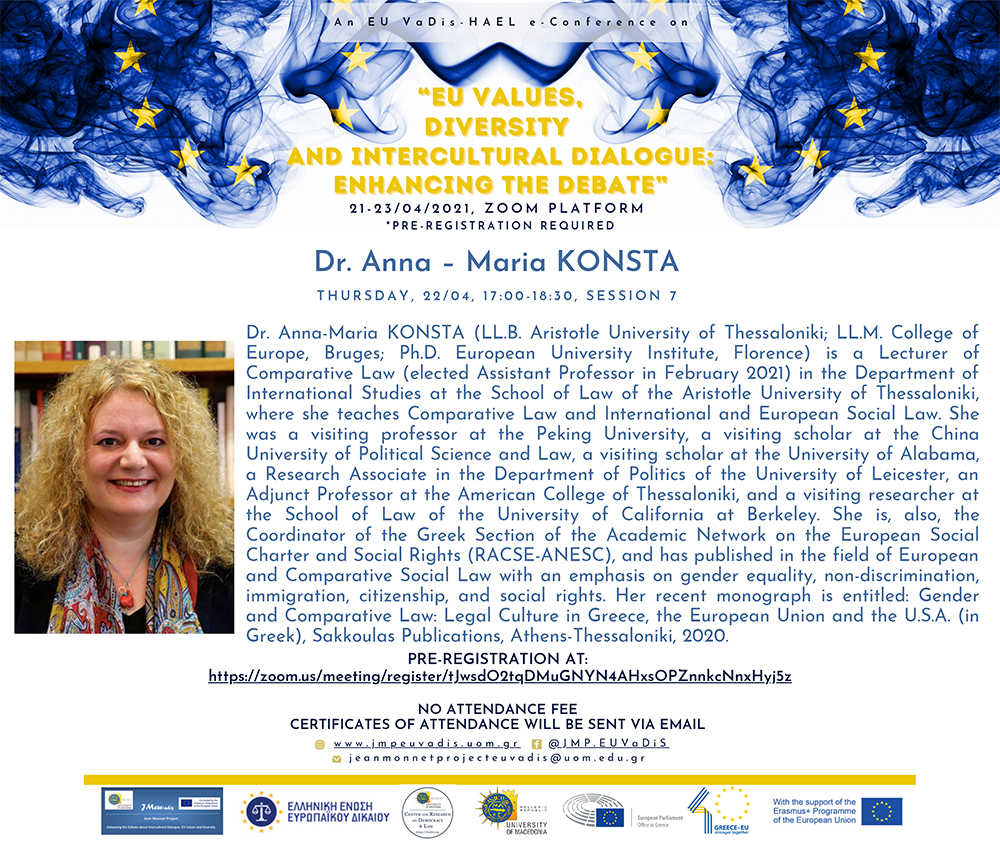
“An assessment of the conceptual and policy underpinnings of the European Union Cohesion Policy in promoting equality in the European Union” is the title of Professor Anastassios CHARDAS chose for his presentation that was a part of Session 7.
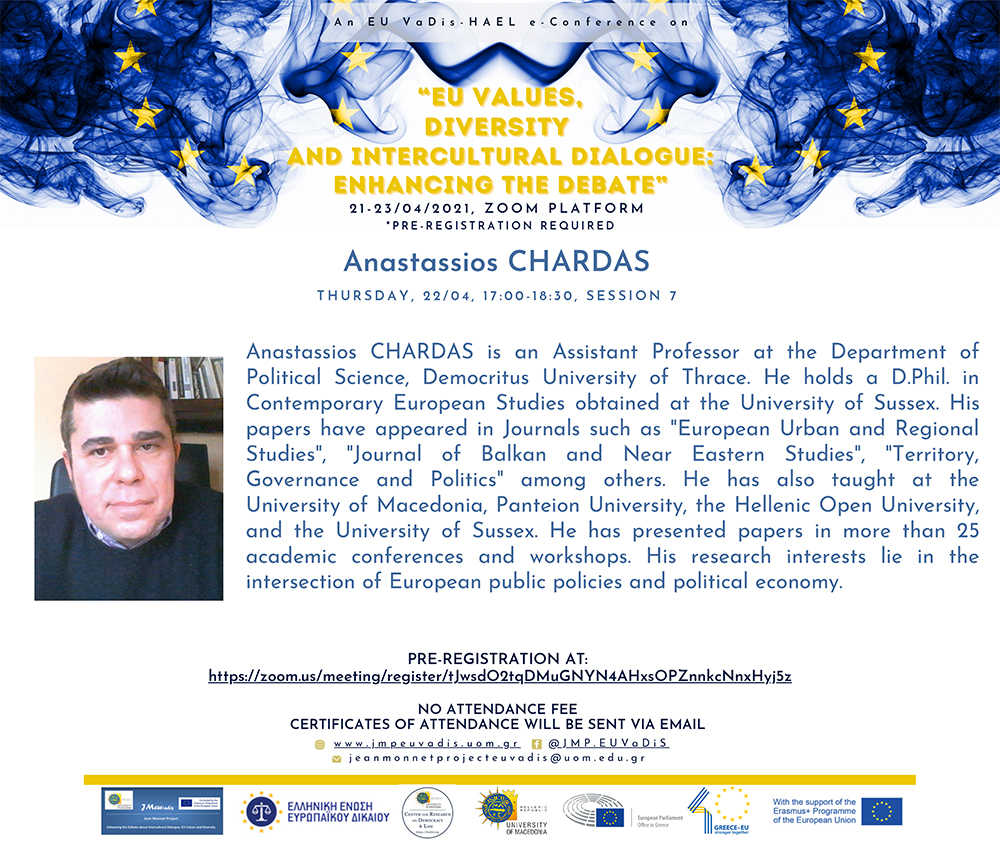
ΘΕΜΑΤΙΚΗ ΣΥΝΕΔΡΙΑ 8
Stelios PERRAKIS
Stelios PERRAKIS, Professor and Dean of the Law School of Neapolis University Pafos, Emeritus Professor of International and European Institutions at Panteion University of Athens, Greece, f. Ambassador – Permanent Representative of Greece to the Council of Europe, President of the Hellenic Society of International Law and International Relations, and UNESCO Chair for “Democracy, Human Rights and Peace” honoured us by accepting to moderate SESSION 8: The promotion of EU Values in the world.
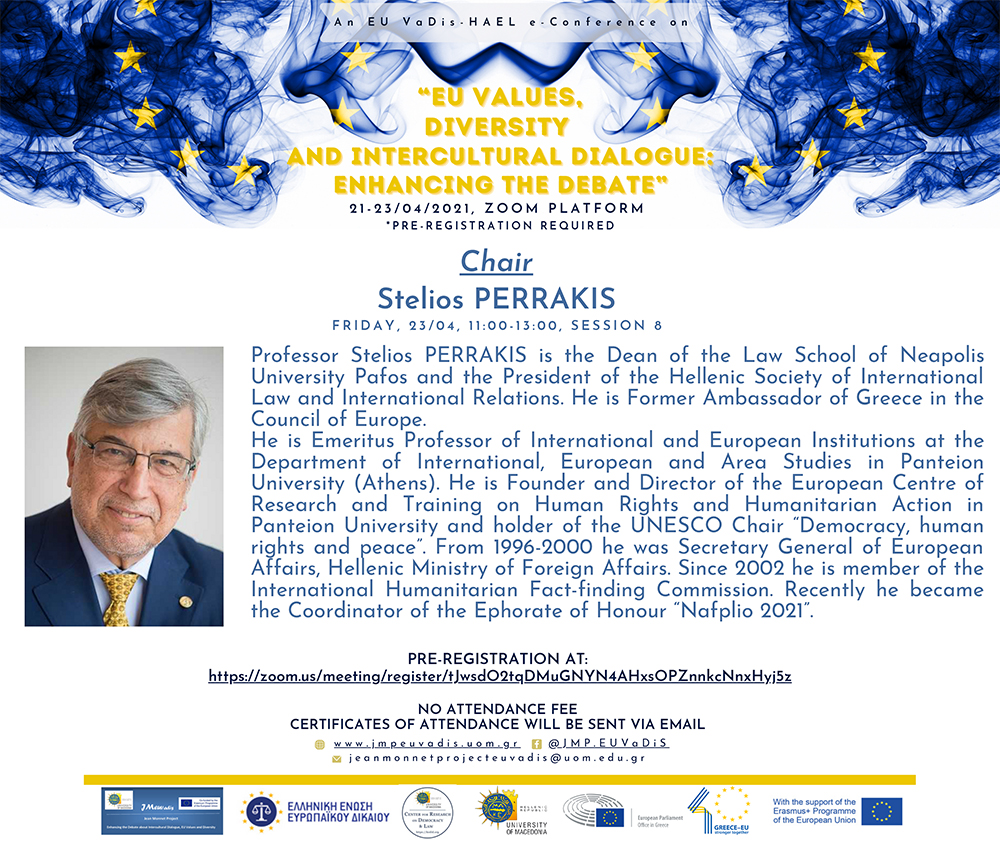
Eleftheria NEFRAMI, Professor at the Faculty of Law, Economics and Finance at the University of Luxembourg, was the first Speaker in Session 8 where she presented her paper on “EU Values in the EU’s external action”.
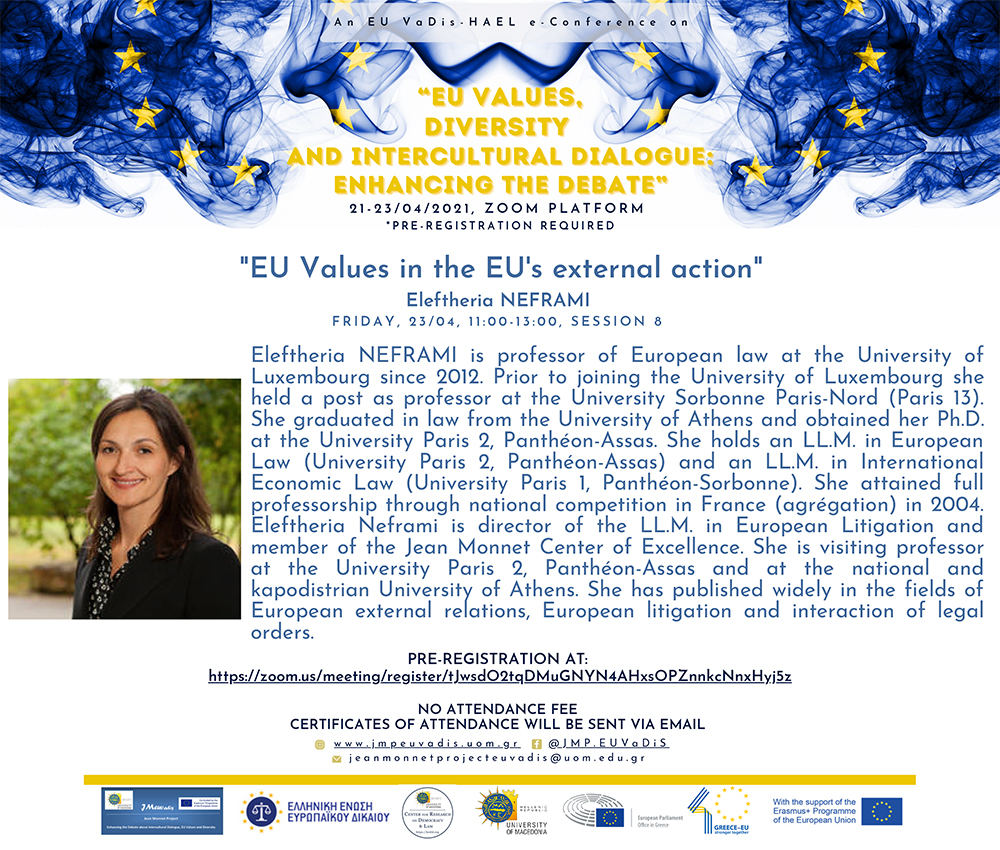
“The promotion of human rights protection in the EU’s external relations: Legal aim or political tool?” was the topic of Assistant Professor’s Manolis Perakis contribution in Session 8.
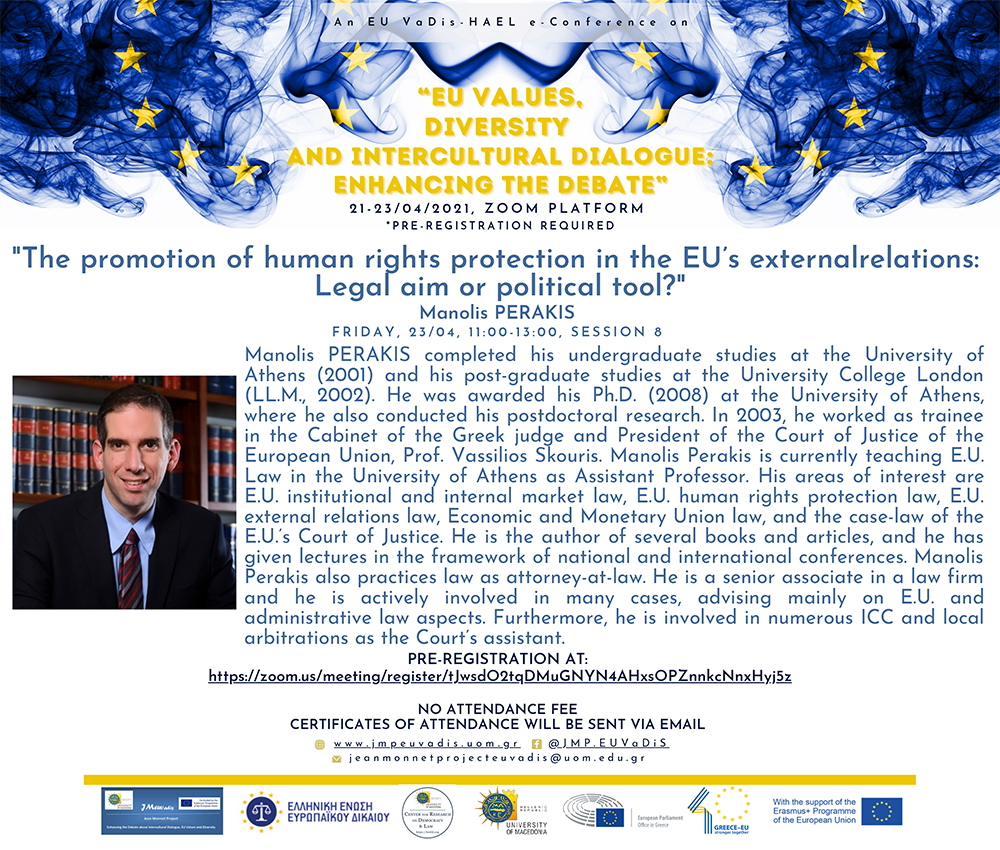
Professor MAGLIVERAS examined the recent attempts of the European Union to further strengthen its sanctioning system against third countries, which are accused of not observing their human rights and rule of law obligations. In particular, the presentation reviewed Council Regulation (EU) 2020/1998 as well as Council Decision (CFSP) 2020/1999, which were approved on 7 December 2020 and concern the adoption of sanctions (or “restrictive measures” in the parlance of EU law) for serious human rights violations and abuses. These two instruments, which create an EU Global Human Rights Sanctions Regime, have been dubbed the EU ‘Magnitsky Act’, after the namesake legislation passed in the USA in 2012.
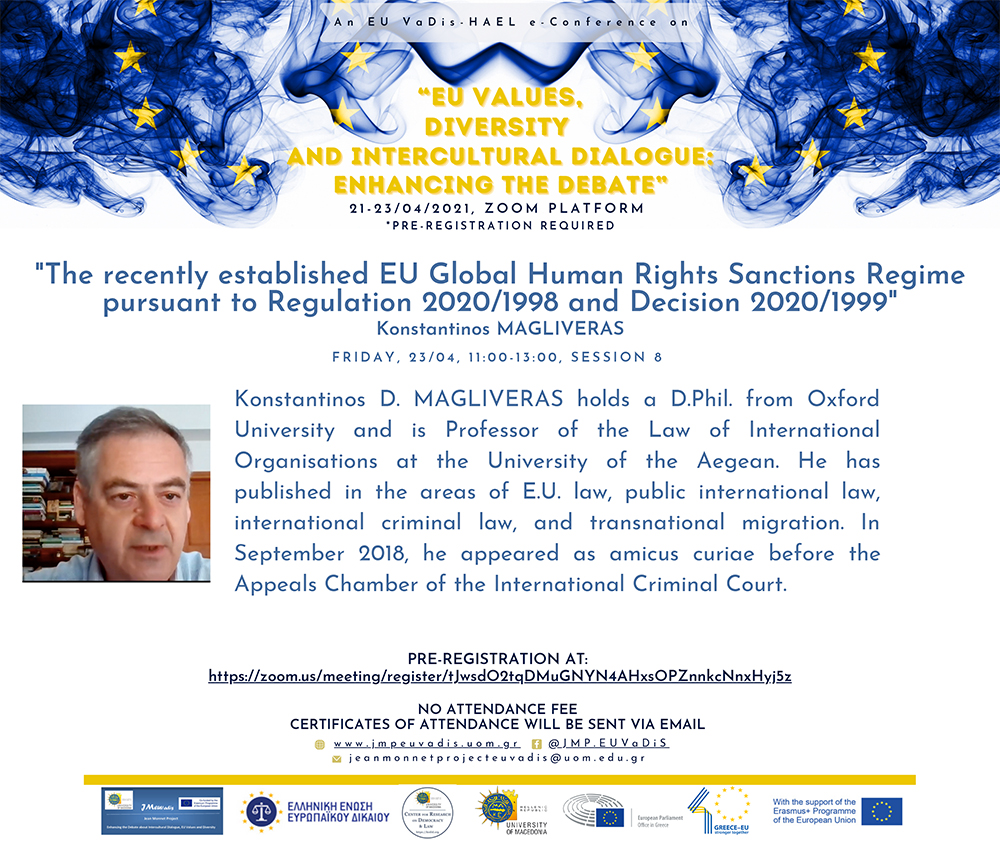
Metaxia KOUSKOUNA presented her parer titled “Promoting the EU environmental model of circular economy at the global level”. In her presentation she discussed the European Green Deal and the Green Deal Diplomacy.
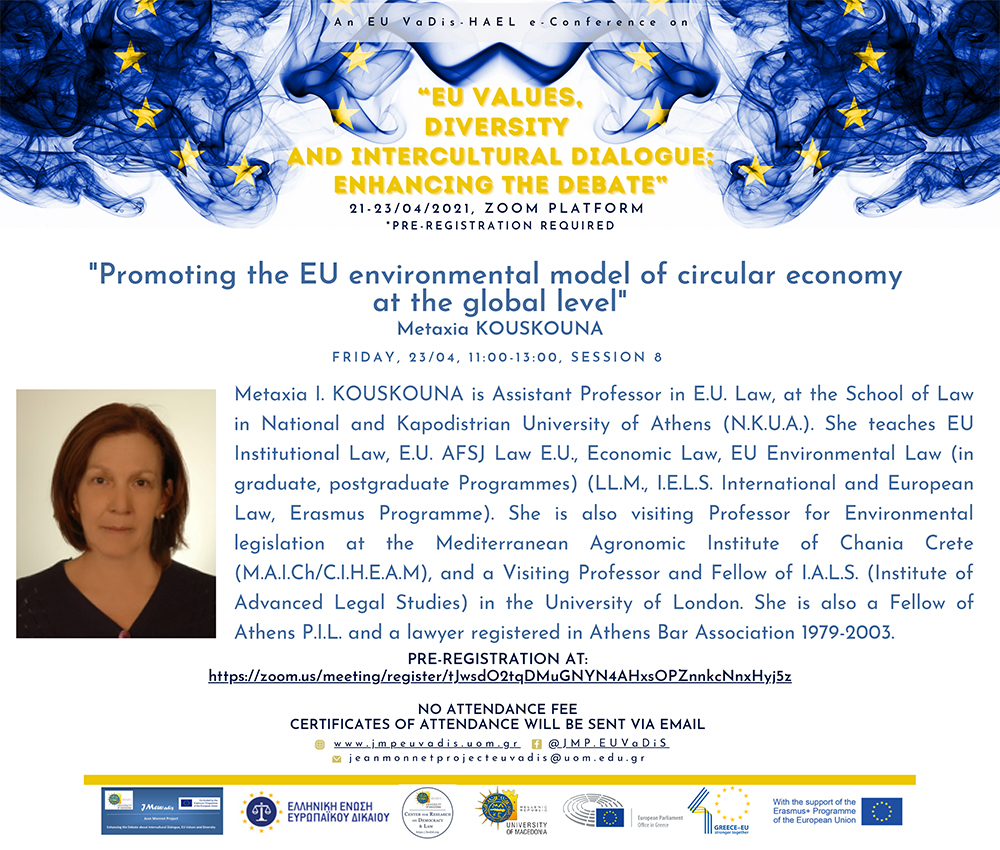
Is there a connection between the United Nations Global Goals for Sustainable Development and the EU Values? Associate Professor Joanna KIELIN-MAZIARZ answered to this question during her presentation in Session 8.
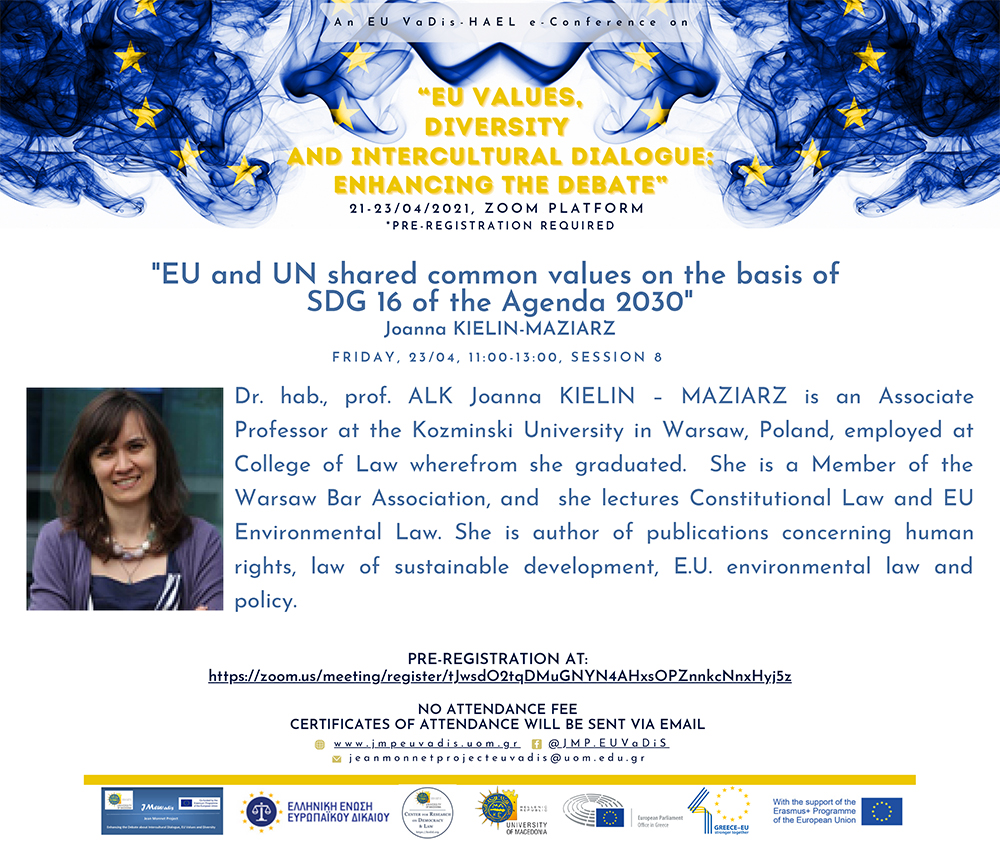
“Common values and the protection of personal data: what identity for the European Union?” is the topic chosen by Professor Laurence POTVIN-SOLIS and Jean Monnet Chair from University of Caen Normandy for her presentation that was a part of Session 8.
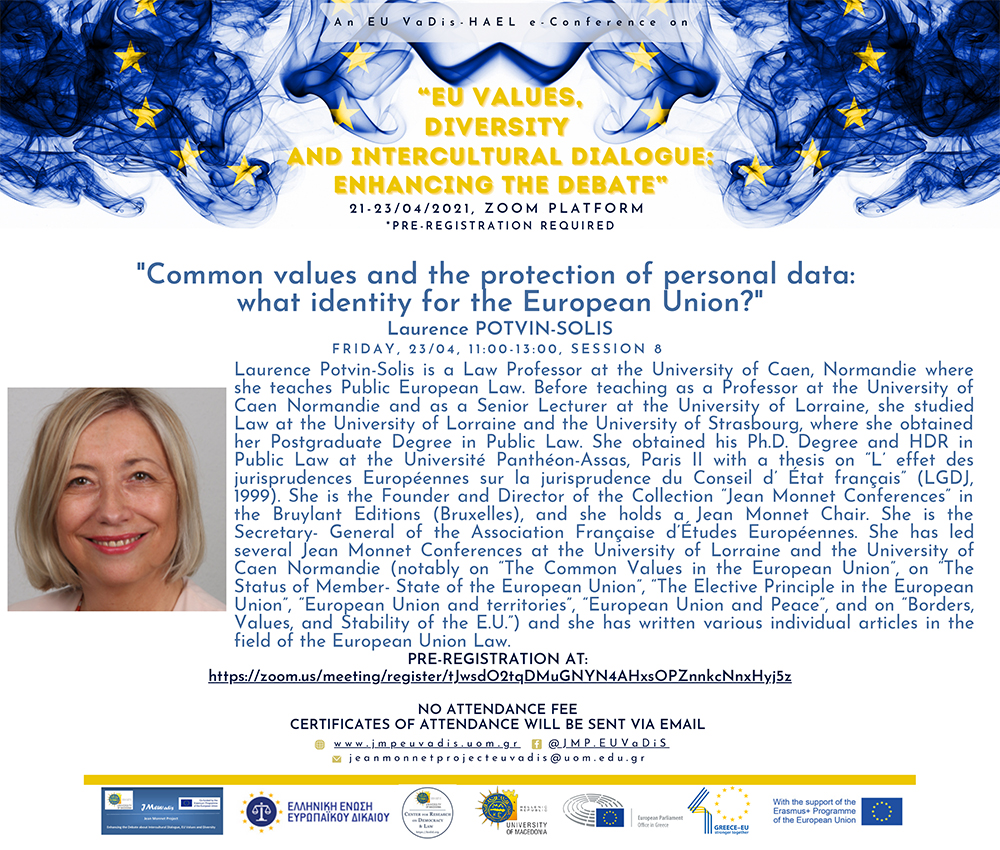
ΘΕΜΑΤΙΚΗ ΣΥΝΕΔΡΙΑ 9
Kalliopi-Ilia CHAINOGLOU
Assistant Professor Kalliopi Ilia CHAINOGLOU moderated SESSION 9: EU Values and Cultural Heritage: Solidarity and Justice and its panel of Speakers who debated the aspect of Culture, and more specifically, Cultural Heritage as a dimension of the EU Values.

Andrzej JAKUBOWSKI
Professor JAKUBOWSKI discussed the question “EU action on cultural heritage: towards a “fairer” and more ethical art market?” during his speech in Session 9.
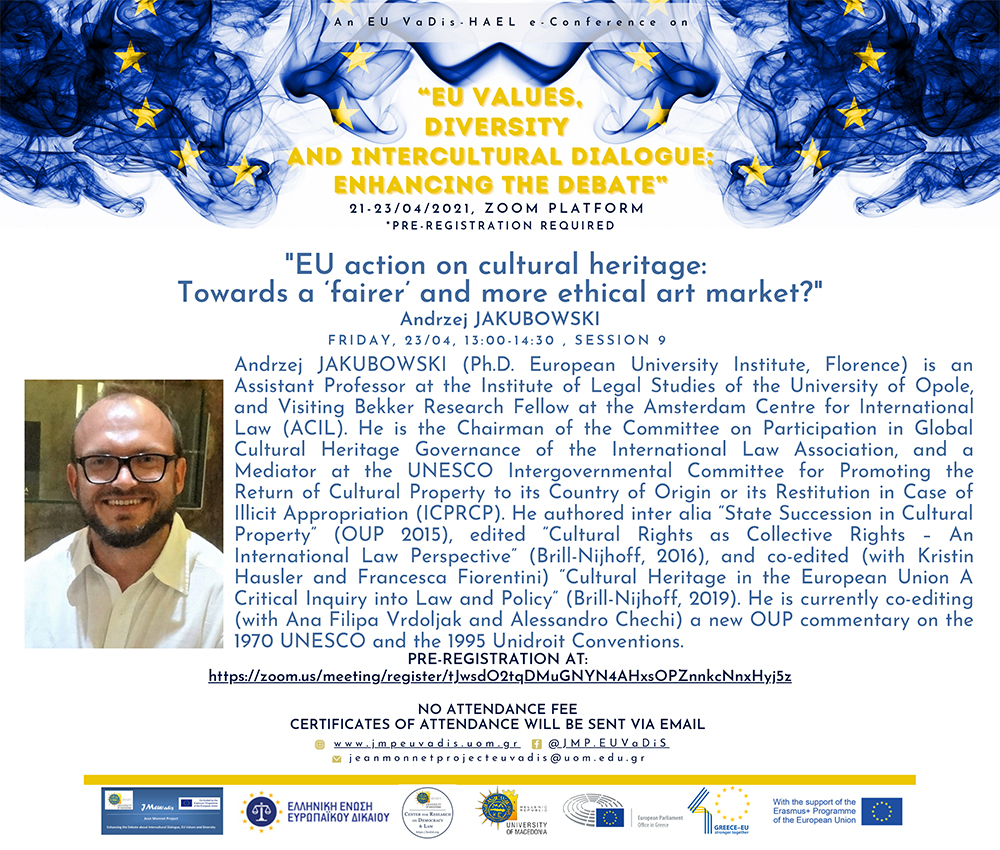
Dr. hab. Mateusz BIECZYŃSKI, discussed “The “Last Leonardo” and the problem of the authenticity on the international art market – general remarks” during his speech in Session 9.
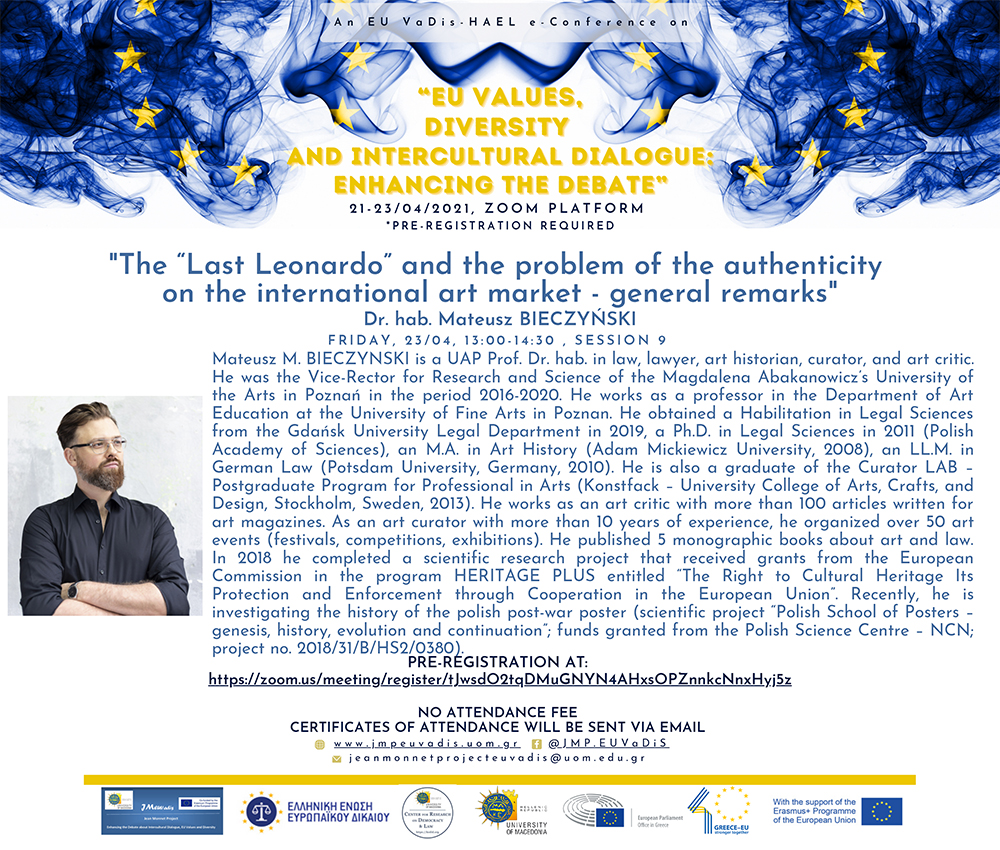
“Heritage professionals on the road towards gender equality? Empirical trends and contradictions” is the title Professor Andreas Joh. WIESAND chose for his presentation during Session 9.
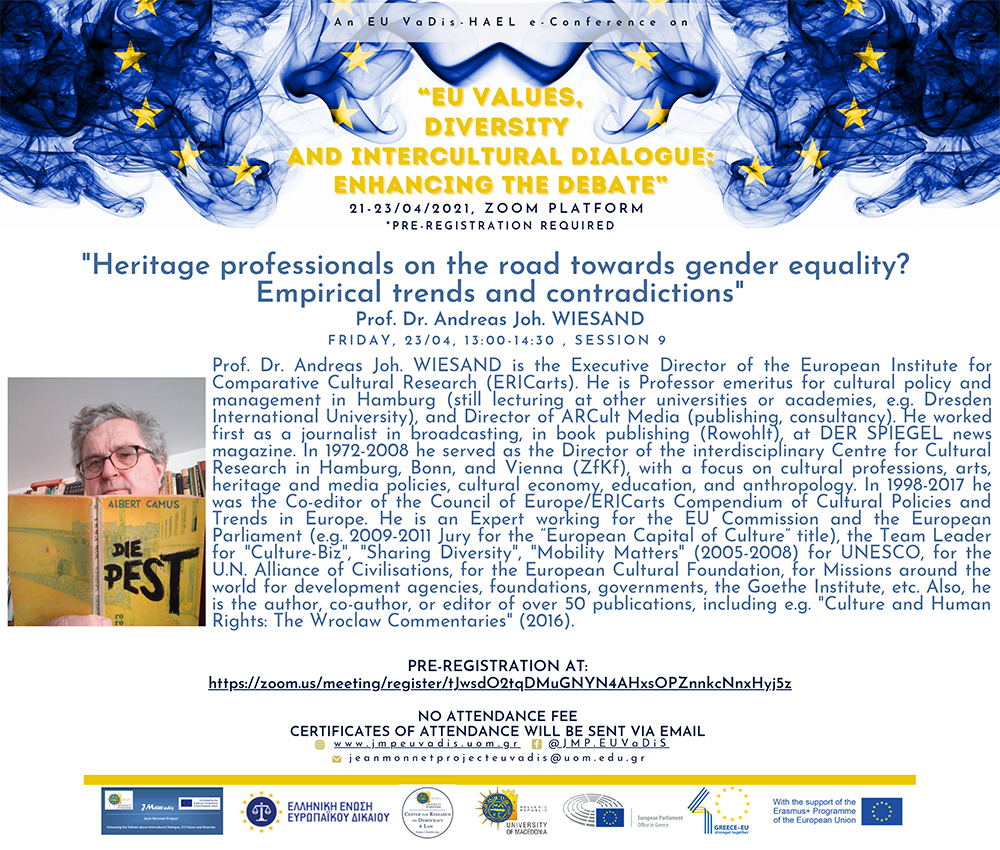
Which are the challenges that populism causes to Art and Culture? And are there possibilities to deal with them successfully? Professor Beatriz BARREIRO CARRIL from Universidad Rey Juan Carlos tried to provide answers during her presentation, which was the last to take place within Session 9 of our e-Conference.
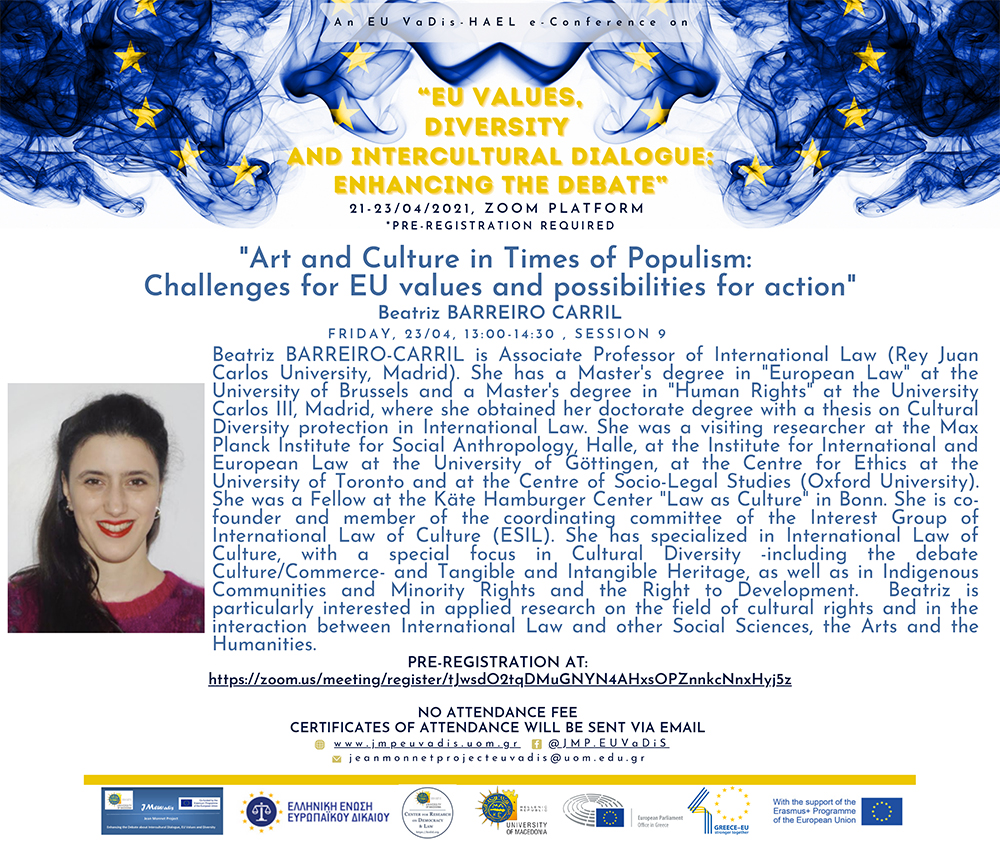
ΘΕΜΑΤΙΚΗ ΣΥΝΕΔΡΙΑ 10
Christos PARASKEVOPOULOS
Professor Christos PARASKEVOPOULOS honoured us by accepting our invitation to moderate the panel in Session 10: The EU Value of Solidarity in the Borders, Migration and Asylum policies and in the management of COVID19.
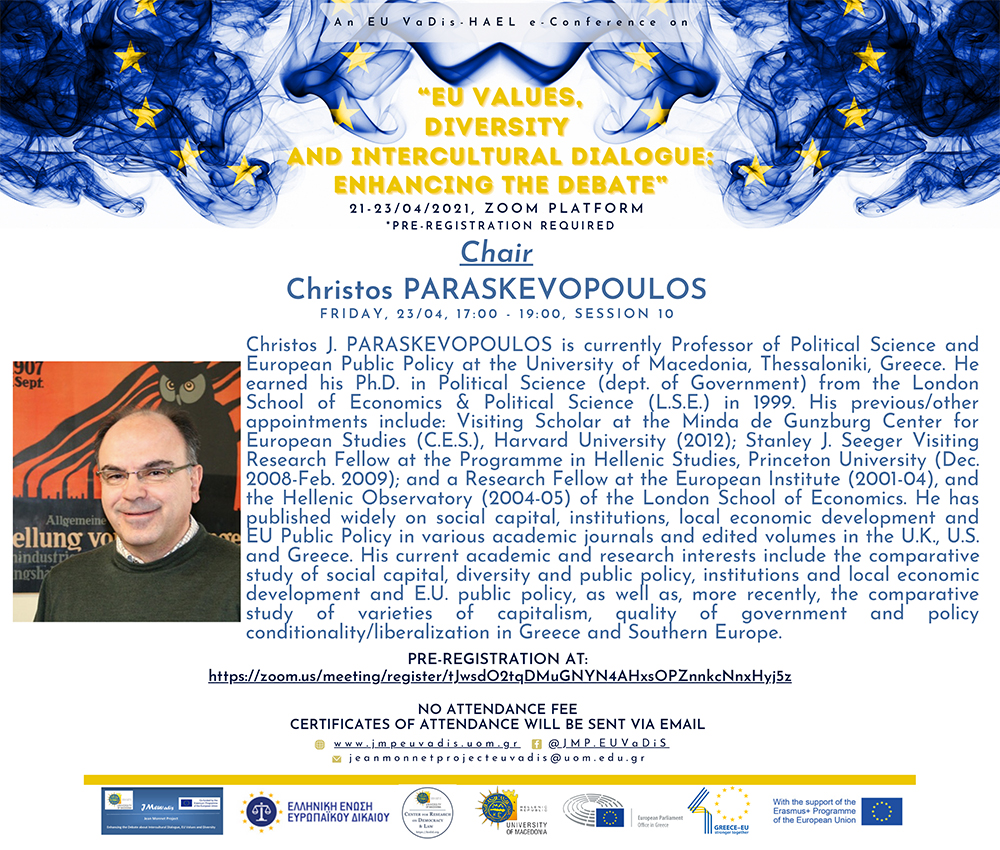
Dr. KOUTSOURAKI Eleni shared with us her paper that examines the continuous efforts of EU member states since the 2015 “crisis” to avoid responsibility sharing in refugee protection by keeping migrants close to the external borders, with special focus on Greece.
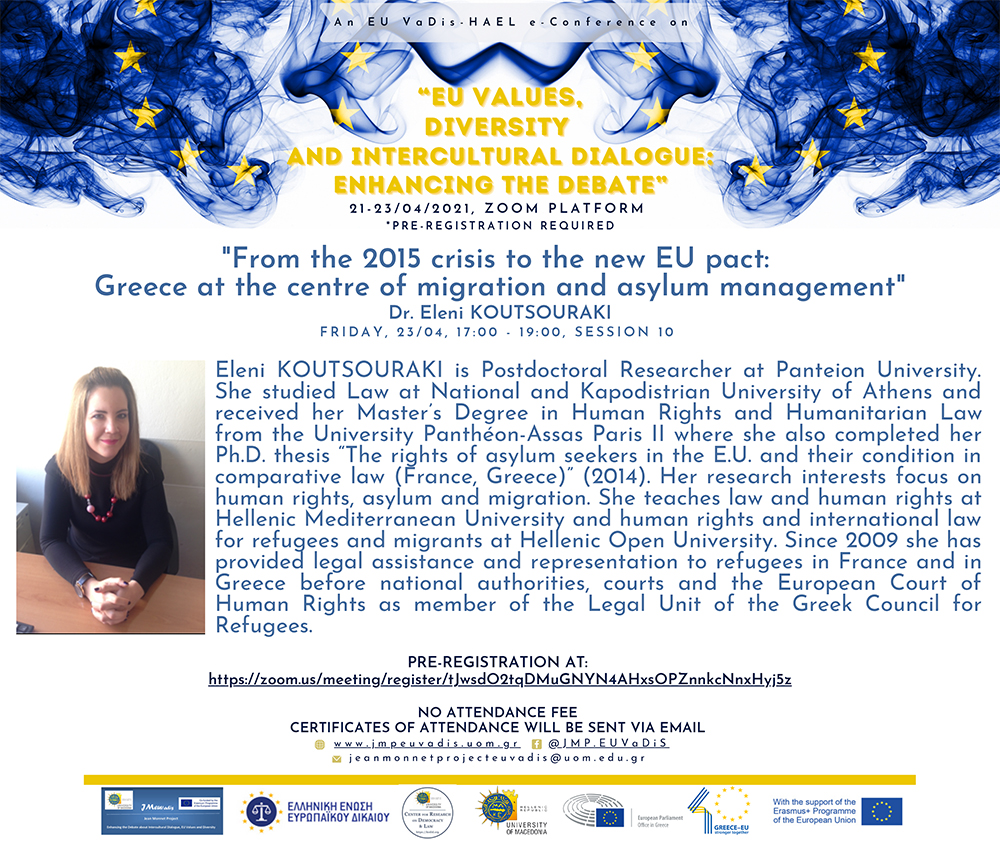
Professor Lilian TSOURDI in her contribution she critically assessed the solidarity deficit in the design and implementation modes of EU’s asylum policy. She analysed the emergency-driven nature of initiatives to realize solidarity to date and their limitations, while highlighting how the COVID-19 pandemic has exacerbated these challenges.
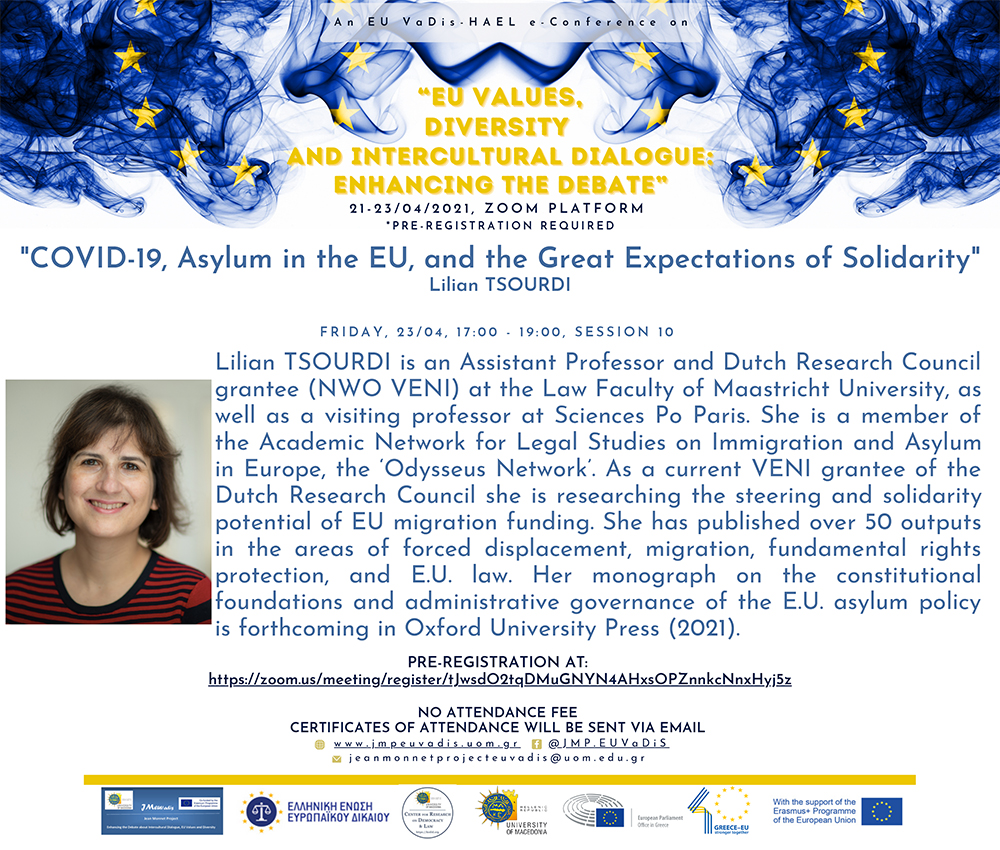
“Debating solidarity in emergency contexts: Crisis and exclusion in EU Migration and Asylum policies during the Covid19 pandemic” is the title of the paper Dr. Elisabeth KIRTSOGLOU presented during Session 10 of our e-Conference.
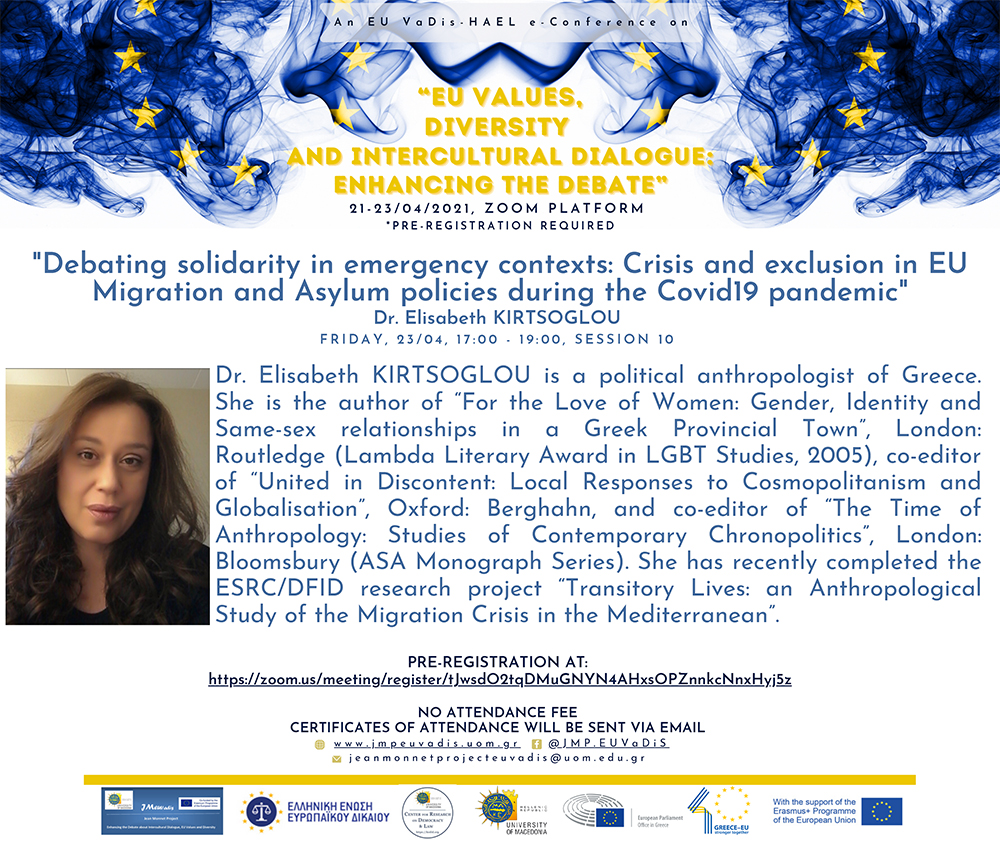
The dimension of “Dignity as a fundamental right in the framework of asylum examination” was discussed by Associate Professor Papadopoulou during Session 10.
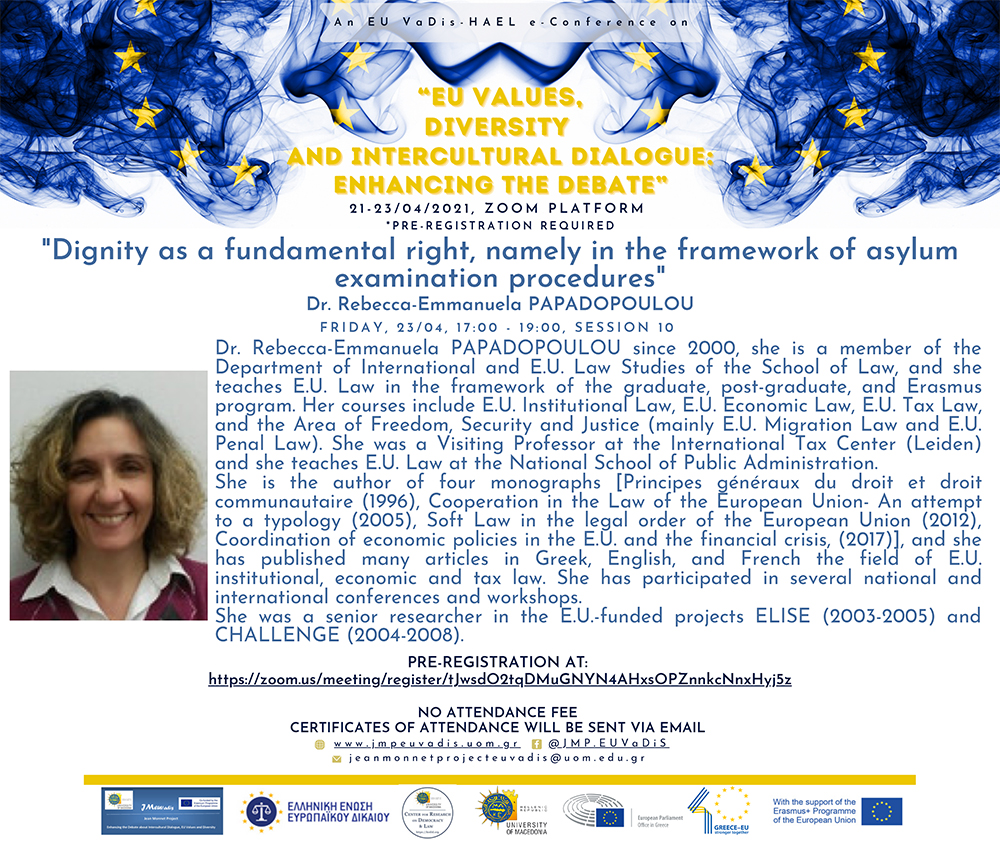
“Reflections on Migration and Solidarity under COVID-19 Global Health Crisis” is the title of Dr. Georgiana TURCULET’s presentation for Session 10.

ΘΕΜΑΤΙΚΗ ΣΥΝΕΔΡΙΑ 11
Despina ANAGNOSTOPOULOU
Despina ANAGNOSTOPOULOU, Associate Professor at the Department of International and European Studies at the University of Macedonia, and Academic Coordinator of the Jean Monnet Project EUVaDis chaired Session 11: EU Values in a multicultural society – how intercultural dialogue may help.

Professor Oriane CALLIGARO commented on “The role of Values in the EU’s approach to European identity” for the debate that took place within Session 11.
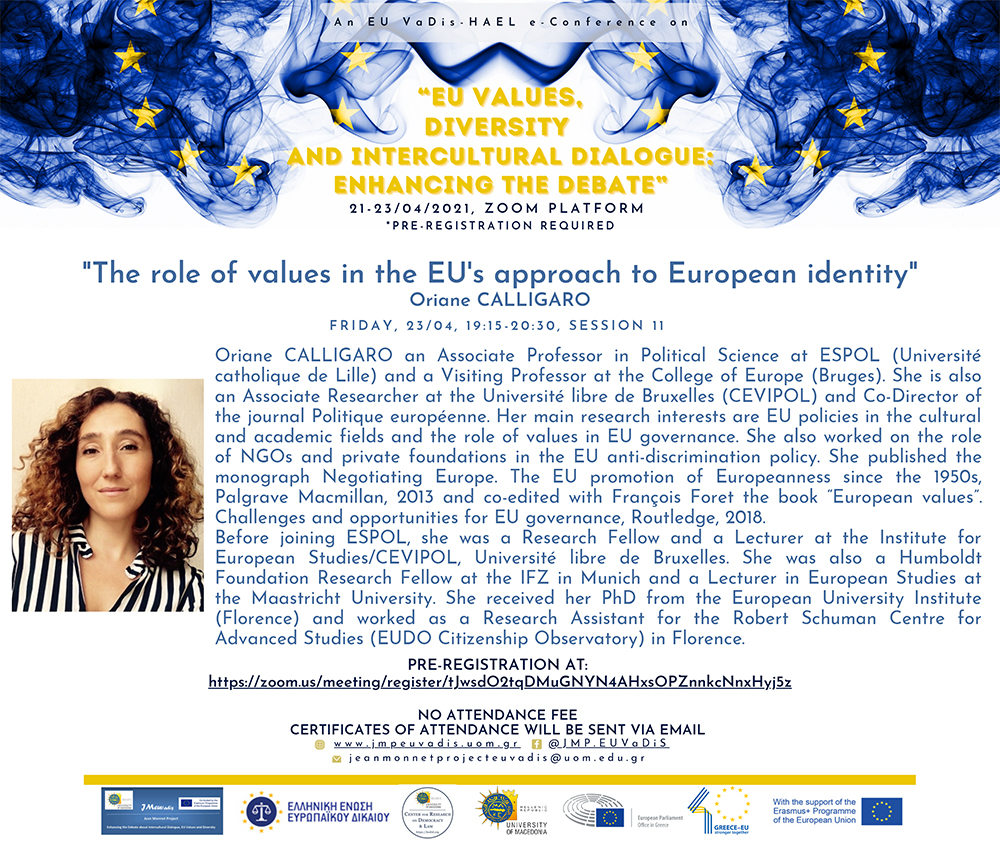
How is Brexit, EU Citizenship, Human Dignity and interculturalism connected? Professor Dora KOSTAKOPOULOU shared with us her input on this topic.
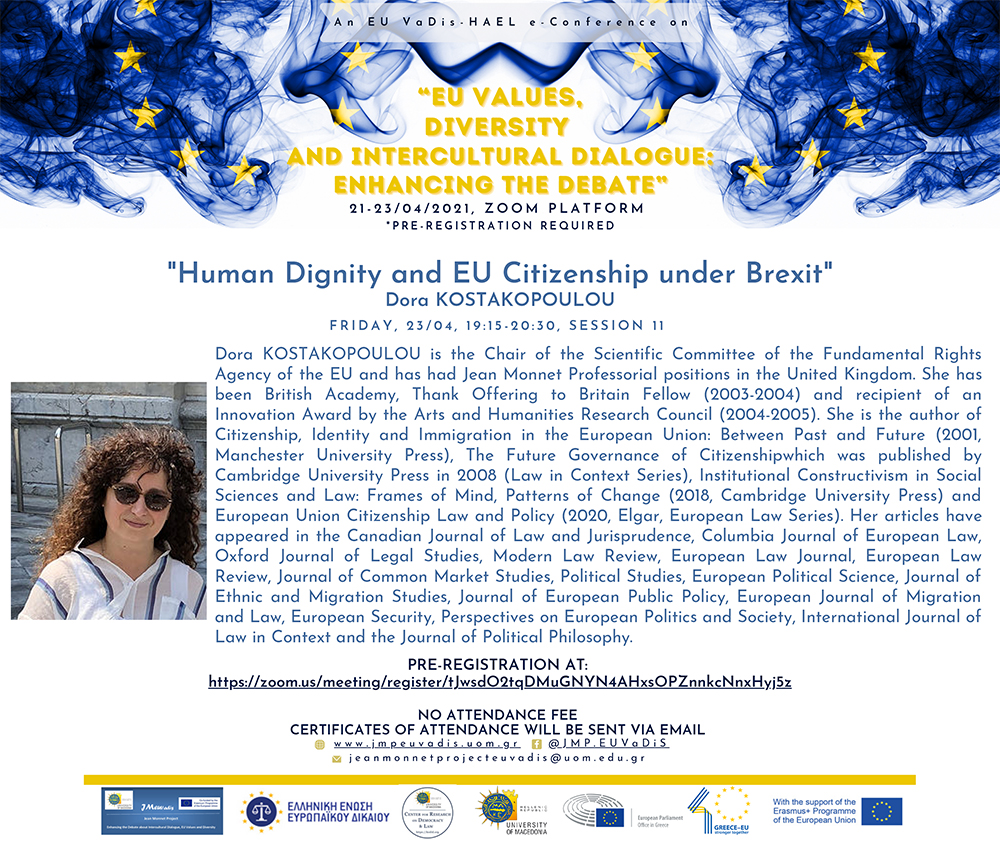
Dr. Nikolaos GAITENIDIS chose to discuss a failure of the cultural diversity, namely the “European Fighters”, during Session 11.
